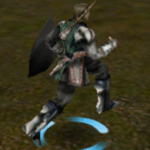|
Dont have much of an input, but I just wanted to say that this has been an amazing read. All the characters, narratives and the different styles you use to convey info (I really likes the fake online class post test session one!) have made it a tantalizing read. Its honestly mindboggling how much effort youve put in. Out of curiosity, did I remember or have you mentioned posting this off-site? I have a few friends I would like sharing this with if that doesnt bother you.
|
|
|
|

|
| # ? Apr 23, 2024 12:37 |
|
Lord Cyrahzax posted:Landon isn't that bad for a Republican, but I get the feeling he isn't running the show Well, they literally are a puppet government, so yeah.
|
|
|
|
Arbitrary Coin posted:Dont have much of an input, but I just wanted to say that this has been an amazing read. All the characters, narratives and the different styles you use to convey info (I really likes the fake online class post test session one!) have made it a tantalizing read. Its honestly mindboggling how much effort youve put in. Out of curiosity, did I remember or have you mentioned posting this off-site? I have a few friends I would like sharing this with if that doesnt bother you. I have a site where I'm aiming to post everything, but it requires reformmating which is work which takes time I don't have. I've got up to the beginning of the war with Germany in here but not the Mongolia or Bhartiya games. I need to get on it, perhaps in August I will have some time. Thanks for the kind words.
|
|
|
|
Chief Savage Man posted:Thanks for the kind words. He's right, this is one of the best-written LPs I've ever seen. Thank you for it.
|
|
|
|
Part Thirteen: The Borneo Identity (Asia & The World: Winter of 1939)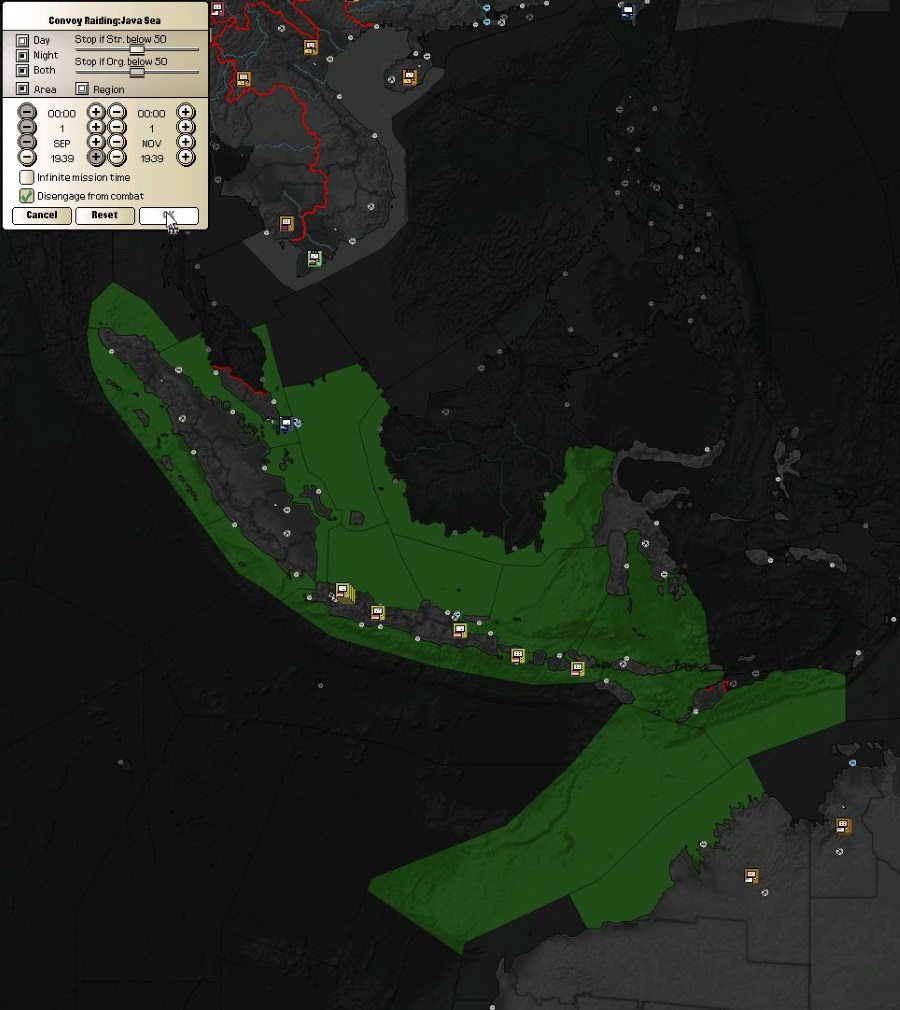 The Imperial Japanese Navy was disappointed when their new allies utterly failed to capture German possessions on Borneo and New Guinea and instead lost the islands entirely. The Imperial Japanese Army was strapped for divisions with the emergencies in India and America, and so for much of 1939 the command had to be content with submarine operations to attempt to cut off the garrisons of both island from resupply. Given that the Germans were also contending with Internationale fleets in their home waters, a high percentage of supplies meant for Borneo and strategic goods from Borneo meant for Germany never made it to its destination. 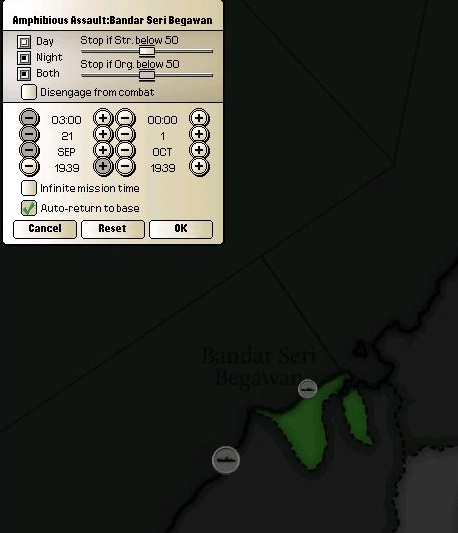 The commissioning of a new cavalry corps gave the Japanese the spare troops required to act against Borneo. The German airfield at Kuching had been able to harass Entente shipping in the South China Sea and the command was ready to secure the lanes entirely. 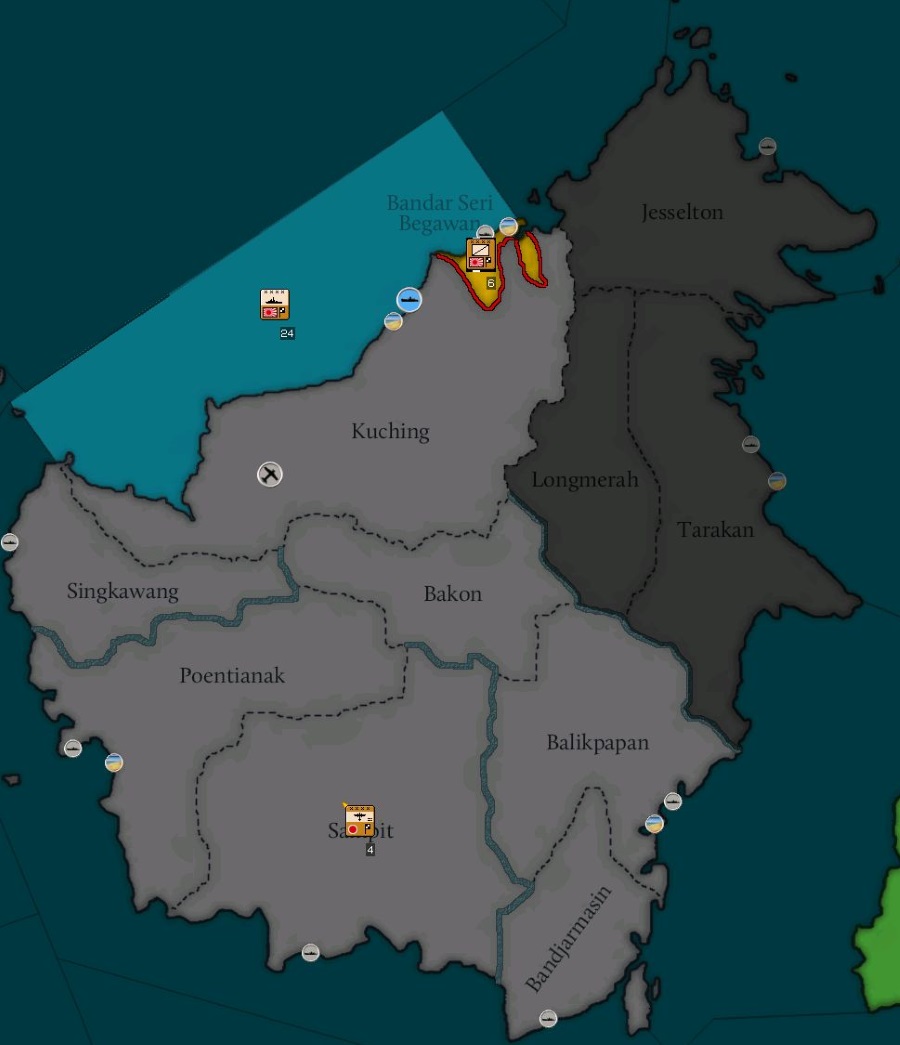 Japanese cavalry came ashore unopposed in Brunei, where the Sultan, chafing under Germany’s demand for more war materiel, welcomed them. 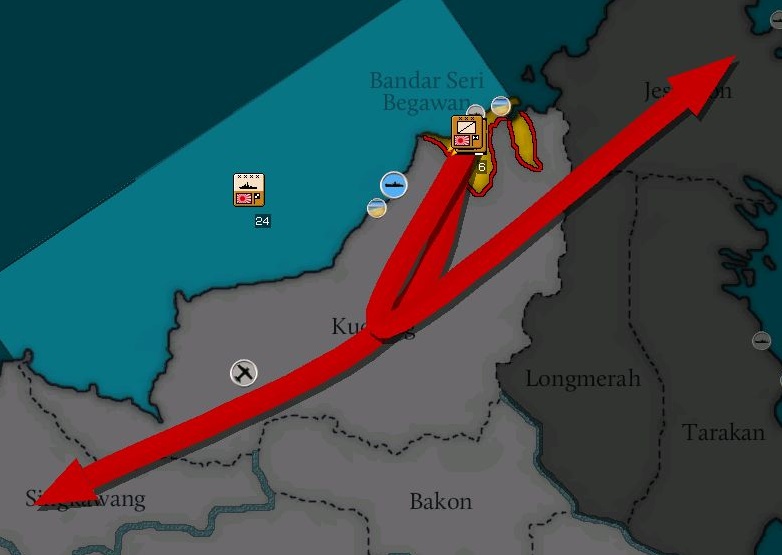 The welcome was short lived as the cavalry quickly departed to secure Kuching, the most strategically important city on the island due to its airfield. 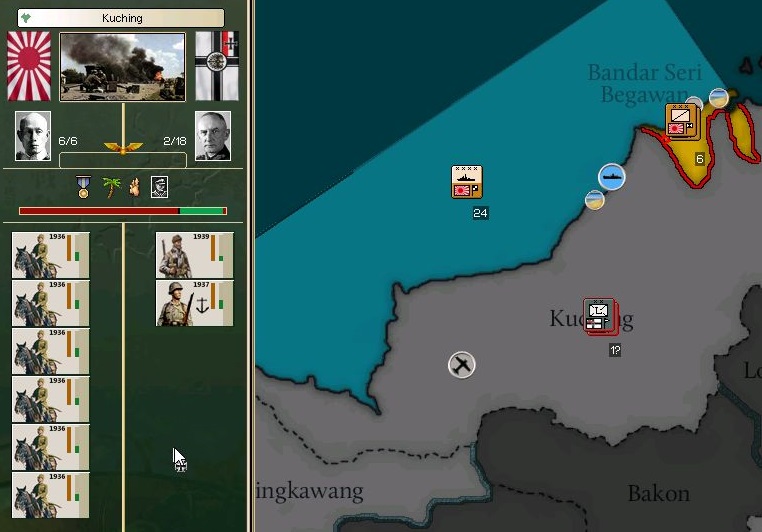 A German Marine unit and light infantry unit arrived to defend their headquarters. 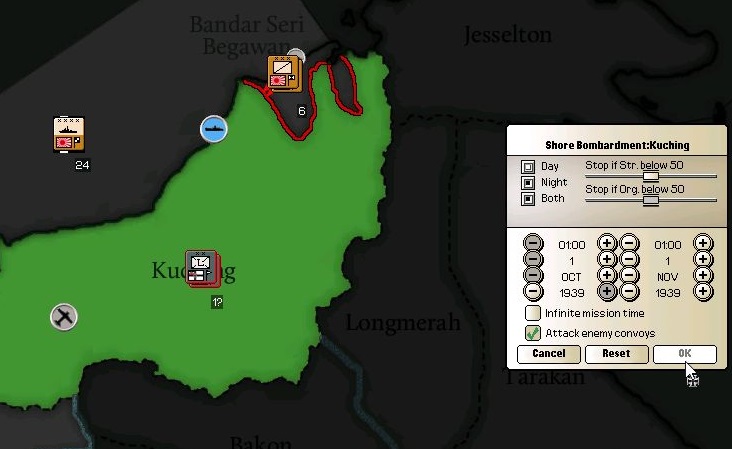 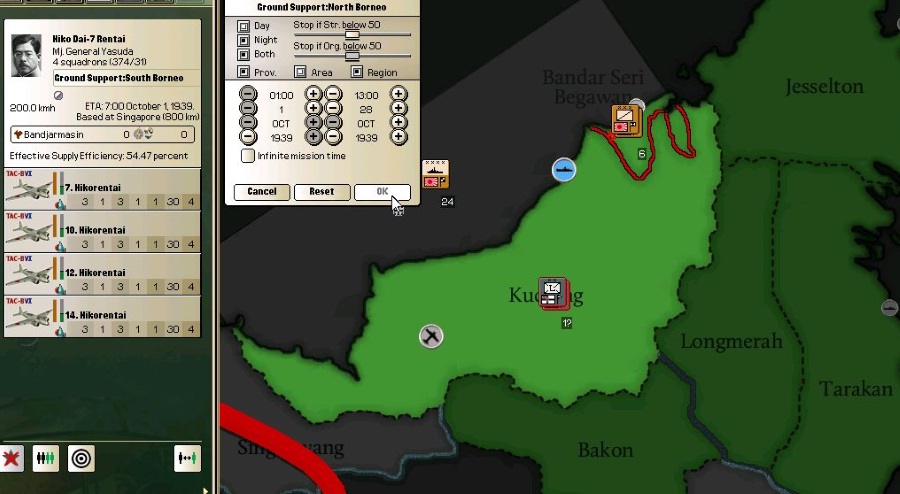 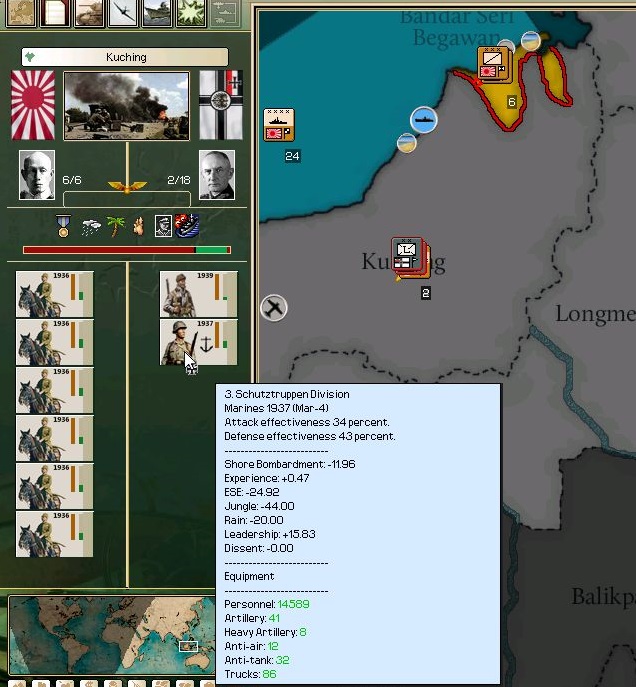 Japanese commanders were eager to retake the island as quickly as possible in order that the forces could be sent to take other German islands, and so the maximum amount of firepower was brought to bear, with Japanese battleships and bombers from Singapore bombarding the German defenses around the city. 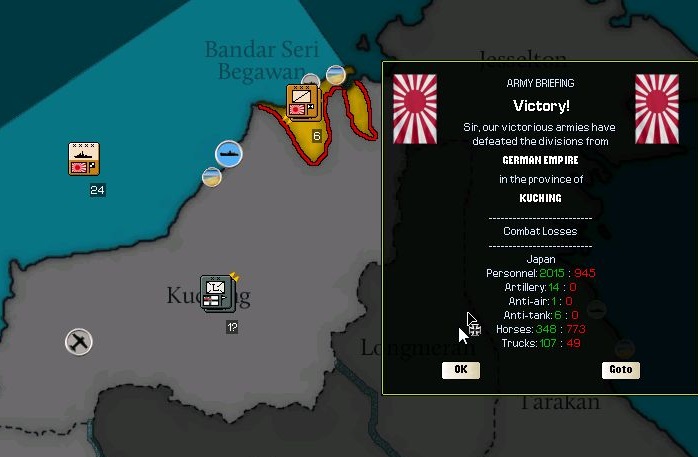 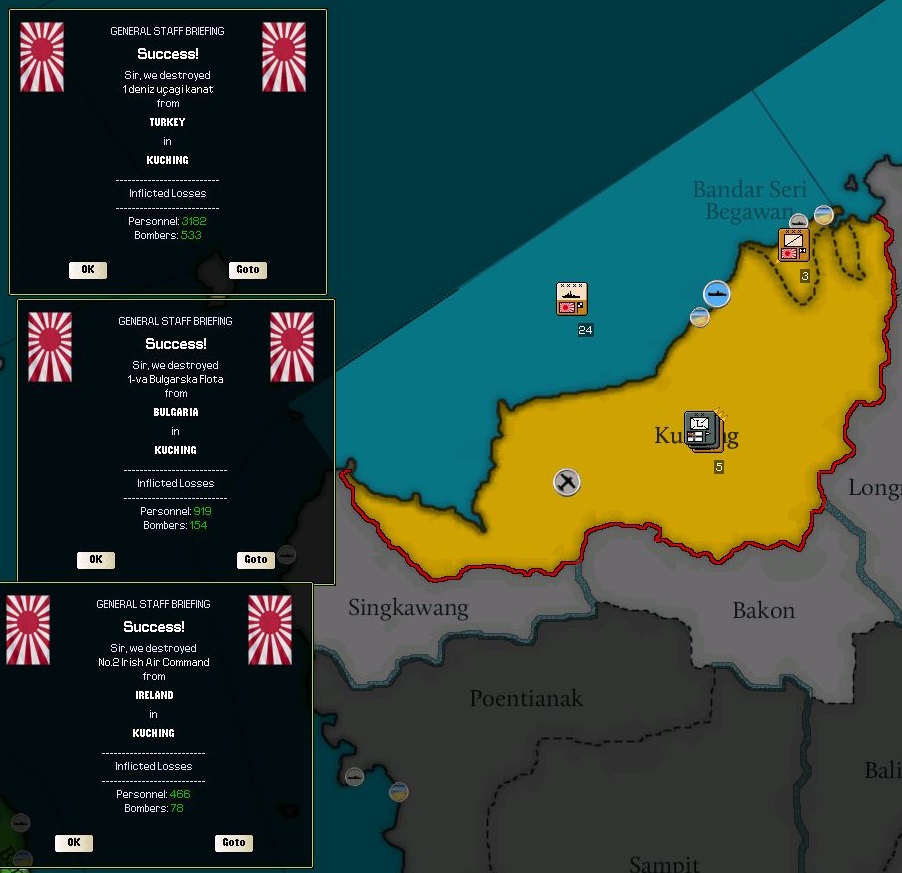 The city fell quickly, and the Japanese captured hundreds of bombers. Mitteleuropa had been pursuing a policy where the air forces of the less advanced minor members of the alliance would defend Germany’s outlying possessions and free up skilled German pilots for battle with the expert British and French air forces in Europe.  With Kuching under control, the cavalry corps split in two in order to take the coasts of the island as quickly as possible. 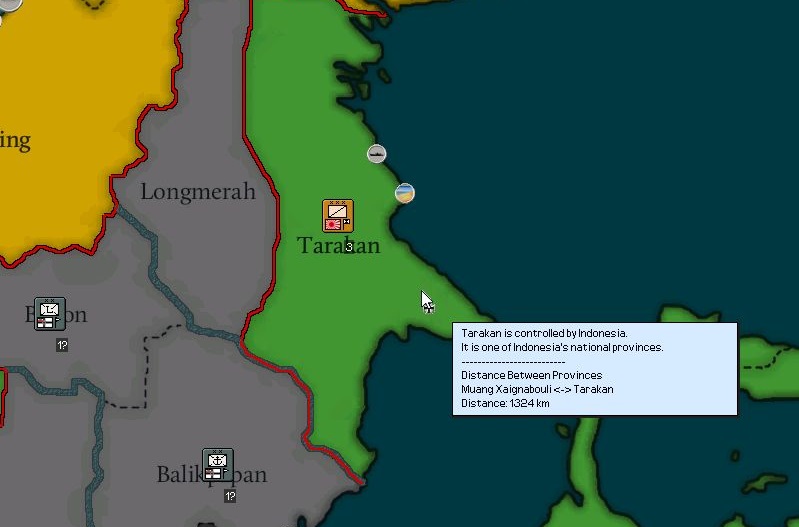 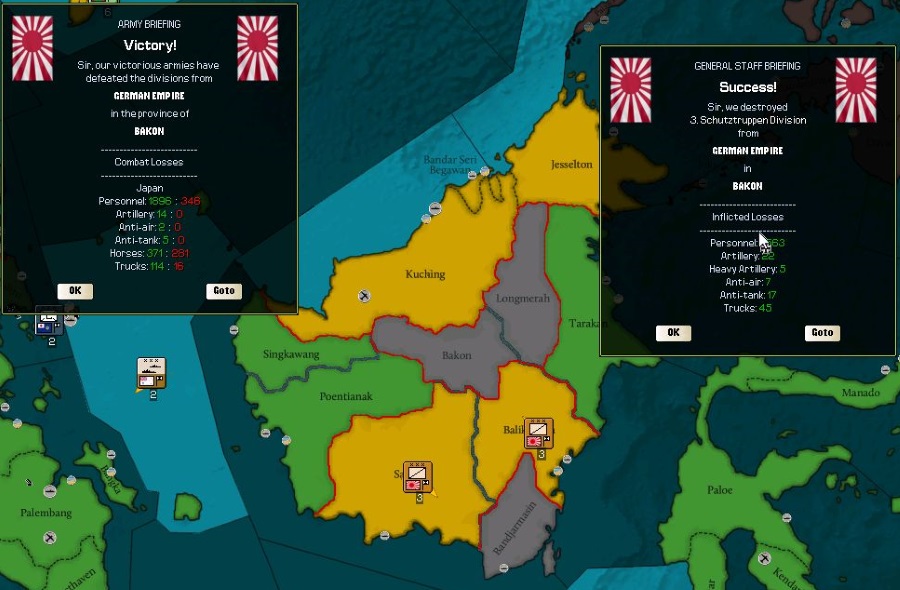 The fall of Kuching neutralized Borneo as a strategic asset for the Germans altogether, as it was the only major port and airbase on the island, but the Japanese refused to let up and forced the surrender of the German garrison a few months later. The Germans had been fleeing inland hoping to wage a long-term guerilla war in order to be a drain on Japanese resources, but the cavalry caught up with them before they could really establish themselves. ~*~*~ 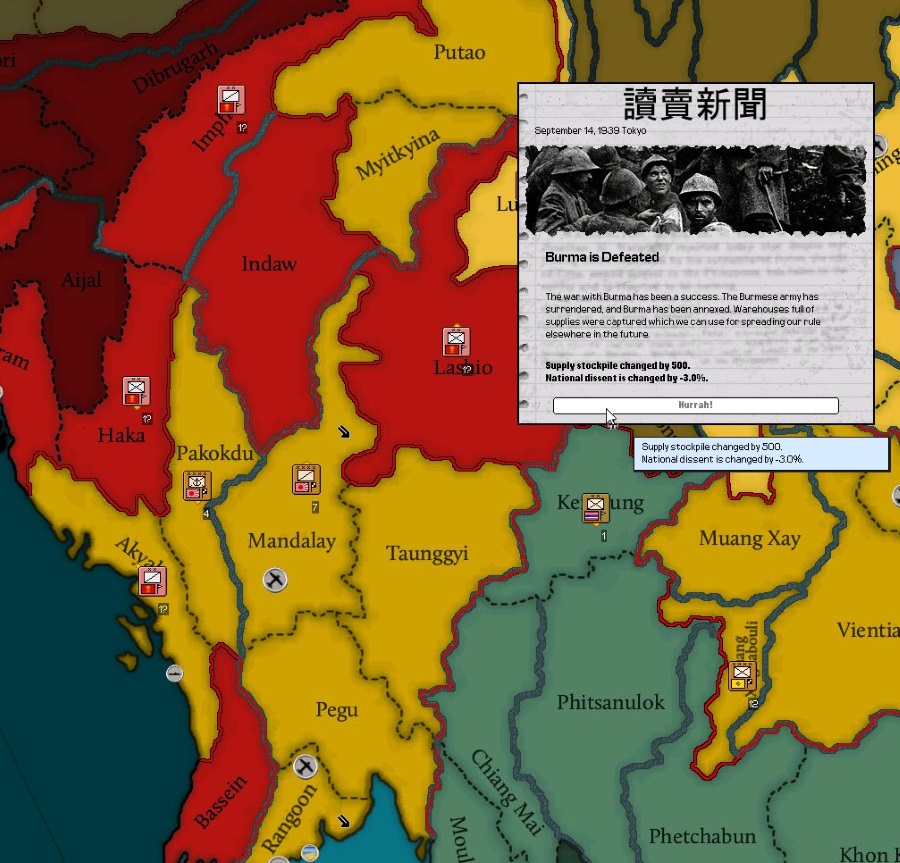 The surrender of Burma was a celebrated moment in Japan, not to the same scale to which the victory over the Qing was regarded, but nevertheless a positive moment for the Minseito. 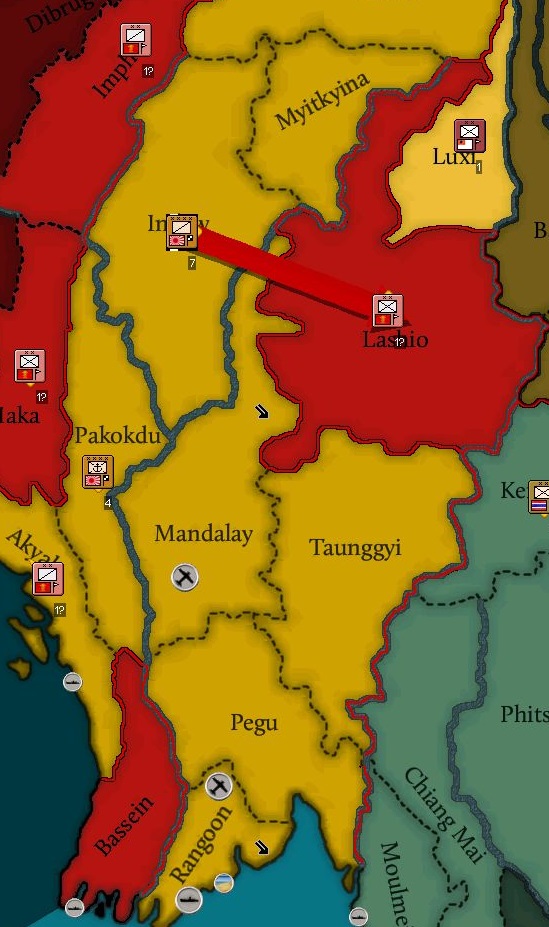 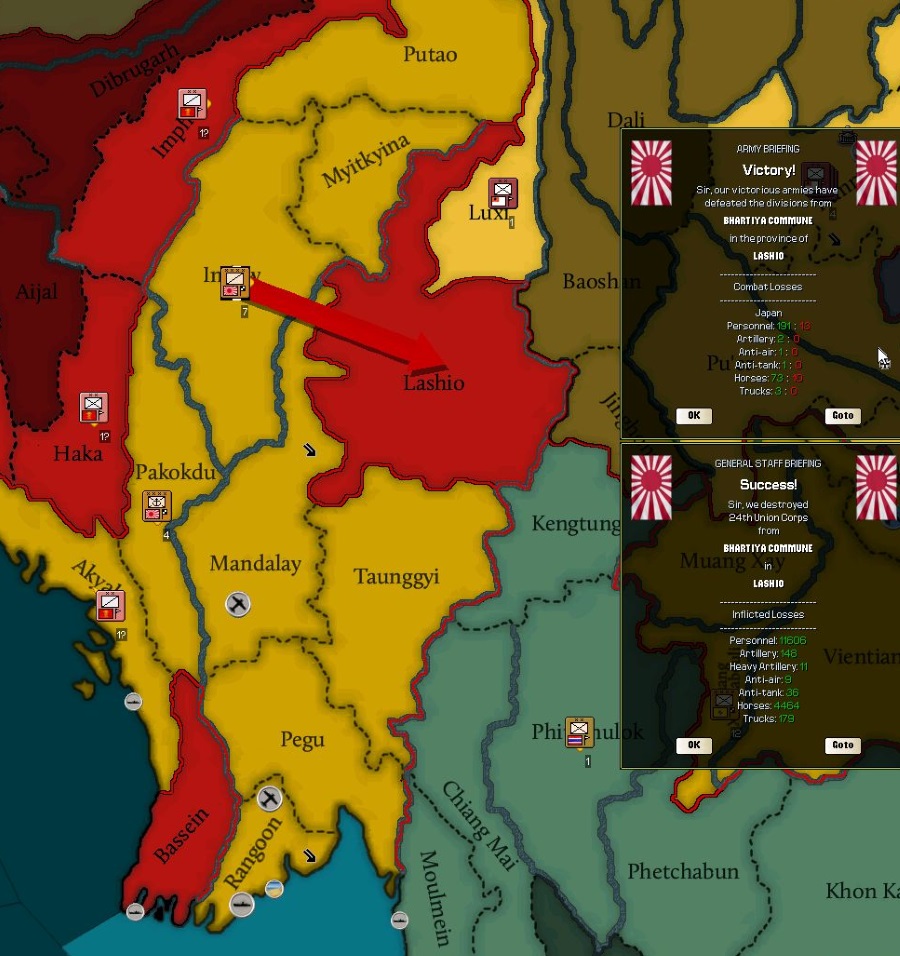 Bhartiya forces in Burma continued to fight on, even though they were surrounded and forced to surrender in due time. 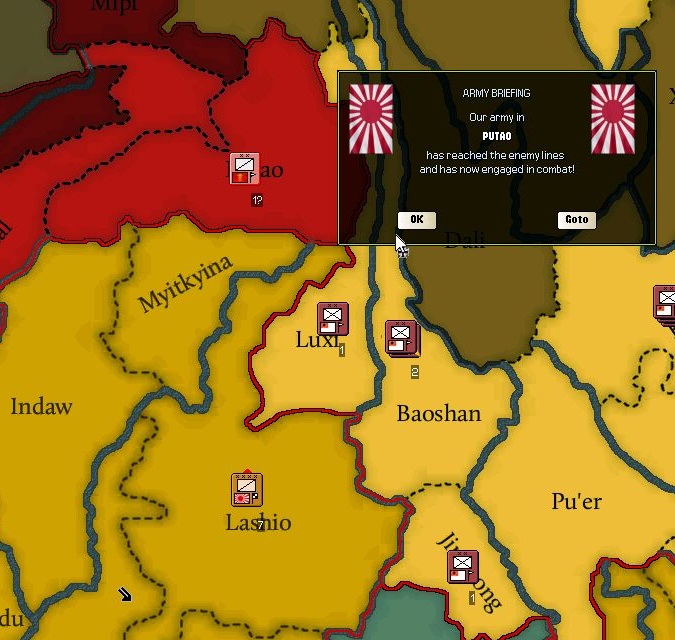 The collapse of the Commune’s ally was something the Bhartiya were not prepared for, and so only a handful of Bhartiya divisions were present to contest the Japanese. 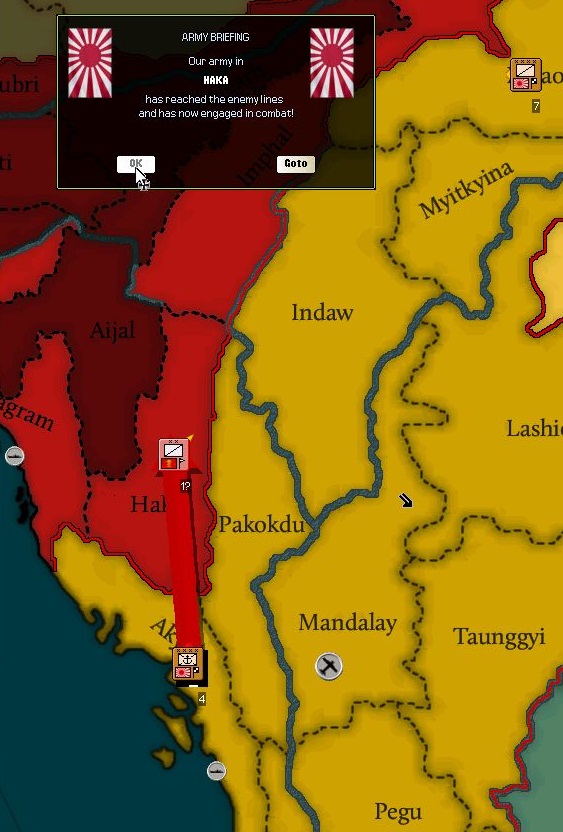 The Marines did not have the mobility of the cavalry however, and so they were relegated to the coast and tasked with holding against the coming Bhartiya counter attack. 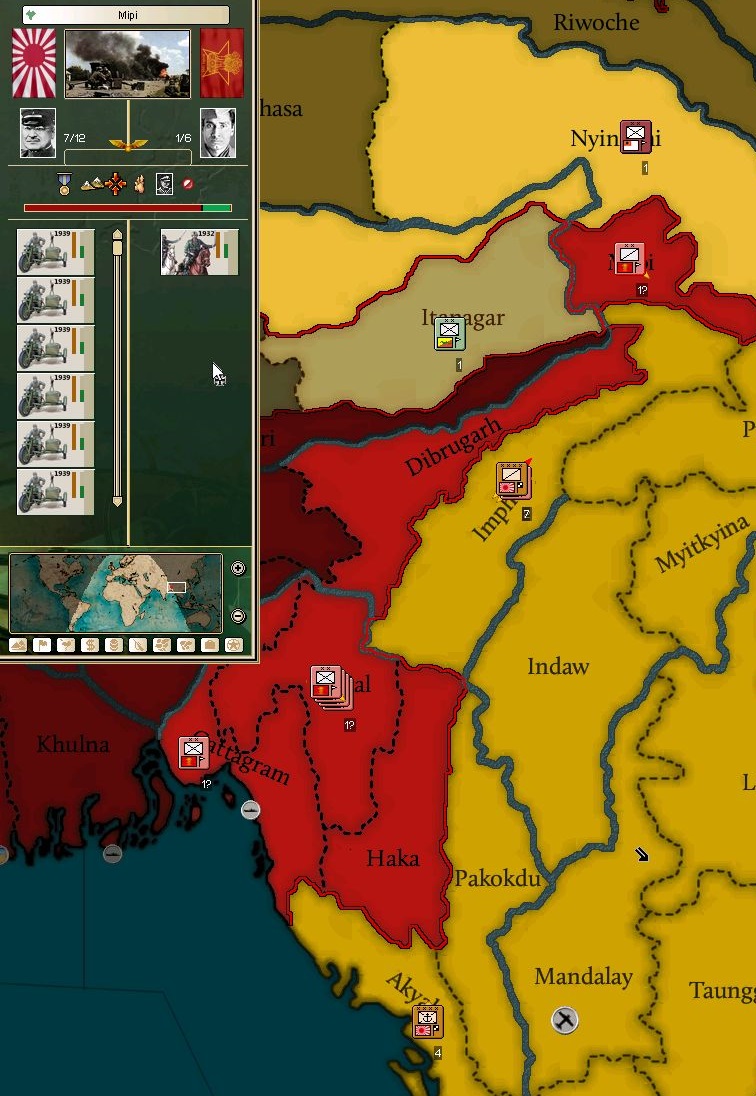 This was in contrast to the cavalry further inland near Imphal, which was able to trap a Bhartiya cavalry division in the far northeast corner of Bhartiya territory, in between the NPA and Bhutanese territory. 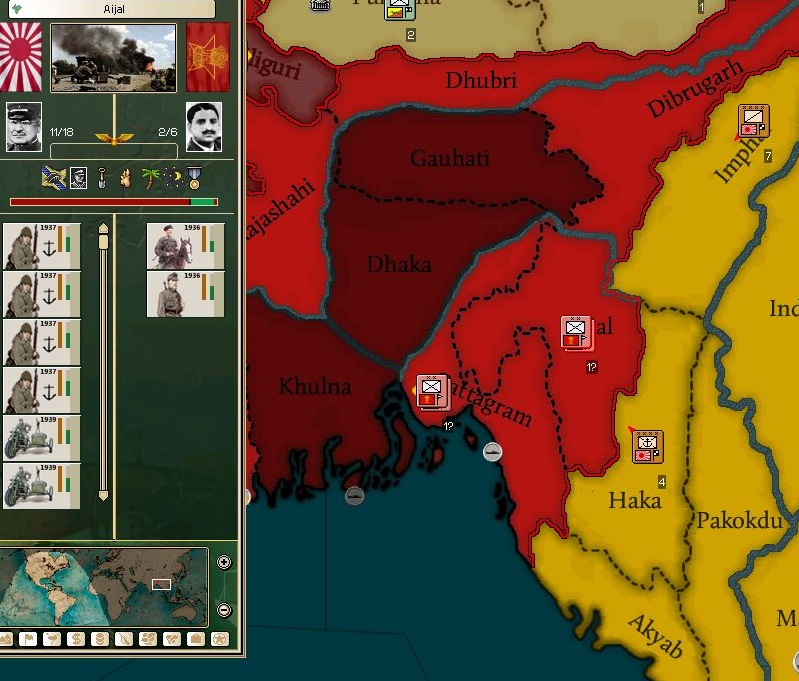 The surrender of the Bhartiya cavalry meant there was no longer a threat of the enemy getting behind Japanese lines and wreaking havoc in Burma and so a renewed push to the west began.  Japanese commanders in the theater were frustrated by the appearance of new Bhartiya forces which retook Imphal, but the general staff was pleased as it meant that divisions were being diverted away from the greater front between Delhi and the Commune. While the invasion of Burma had been a partially imperialist venture with the goal of expanding Japanese influence in South Asia, there was no question that any territories beyond the Burma-India border would be handed over to Delhi. 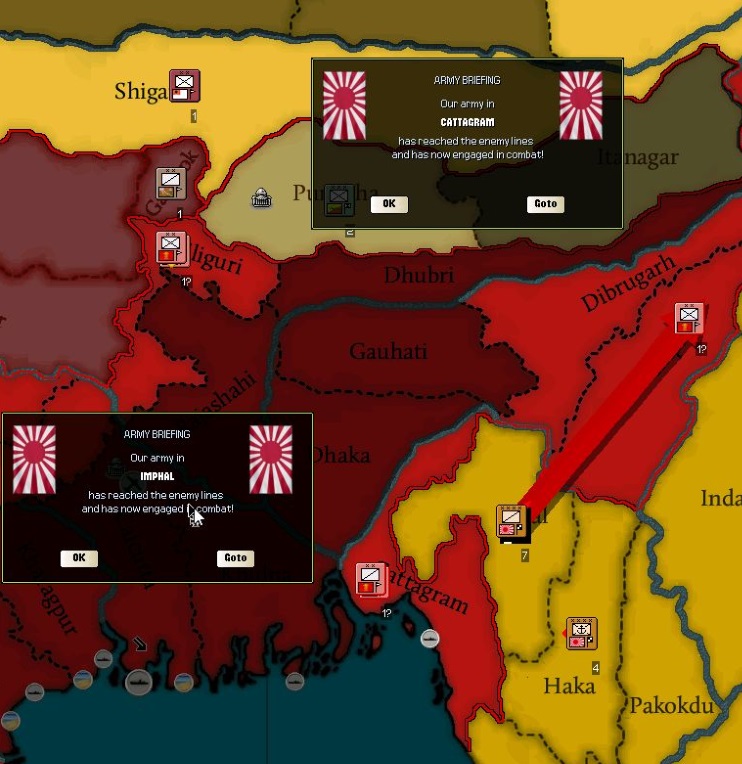 Therefore, there was little motivation to expend Japanese blood and treasure to push into Bengal. The Japanese High Command was satisfied with the progress made, and orders were given to secure Burma and to advance if possible, but no further assistance would be coming. ~*~*~ 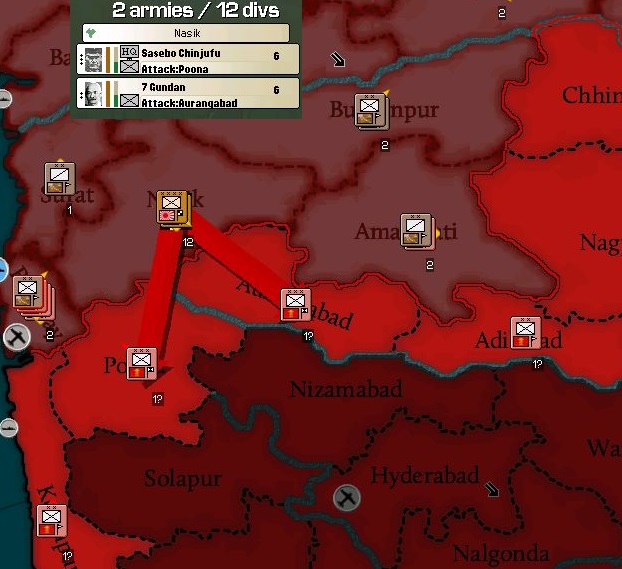 The Japanese Expeditionary Force in India, after halting the Bhartiya advance towards Gujarat, began to advance into the rest of Maharashtra. 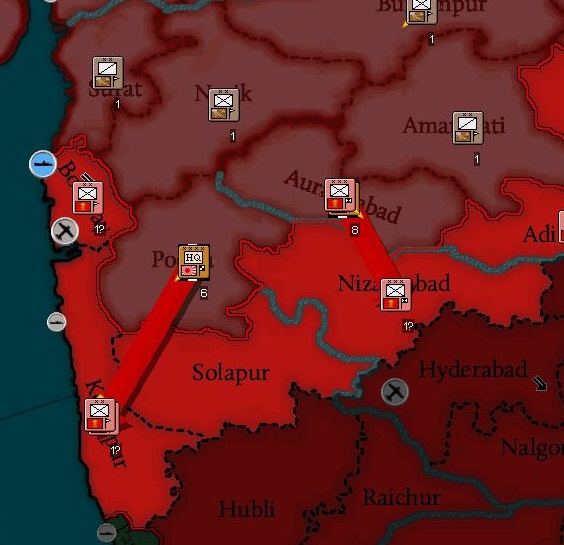 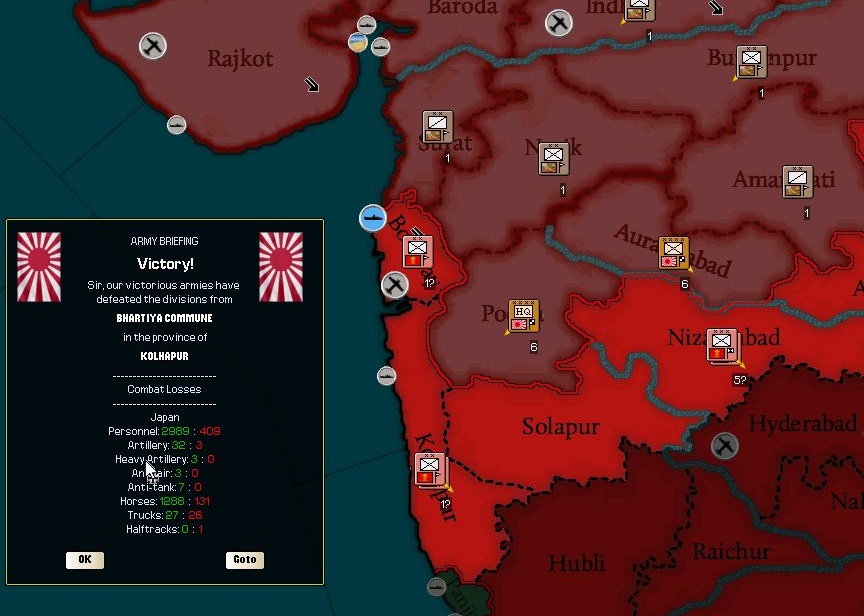 Bombay was traded back and forth between Delhi and the Bhartiya Commune repeatedly, devastating the city, but JEF-India moved to cut off the city and capture it permanently for the Entente.  The presence of the Japanese in Burma and Maharashtra was the clear difference maker in the War for India. The Bhartiya Commune held the advantage over Delhi on most sections of the front, and Japan’s elimination of Burma from the war and the twenty divisions they involved were going to win the war for Delhi. The only question was how quickly. 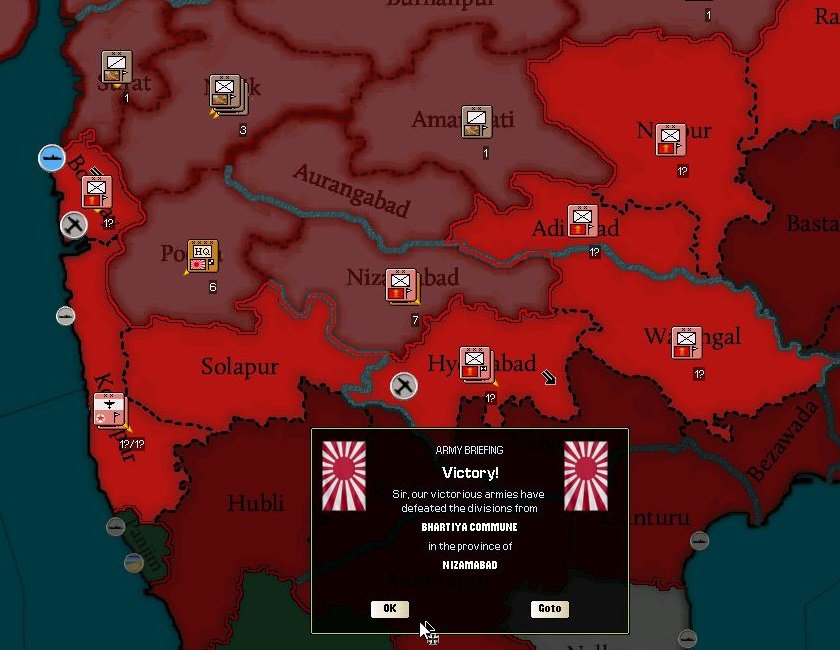 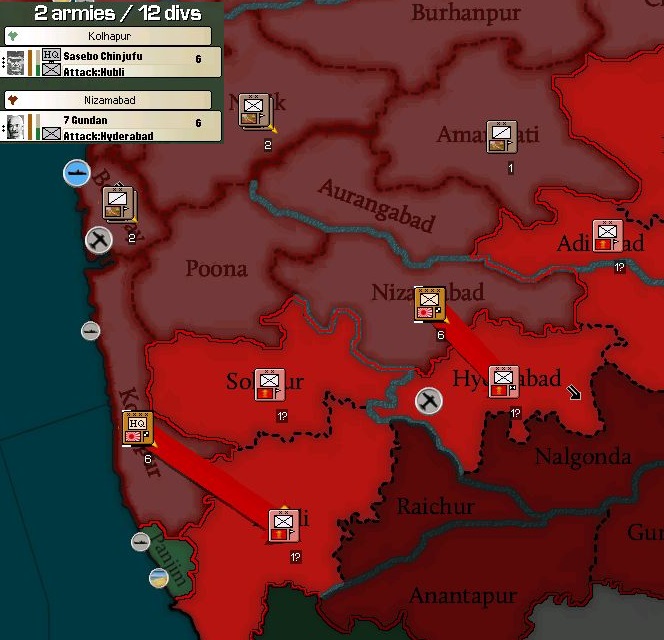 The Entente sought to secure major cities. The former Princely Federation of Hyderabad was one such important target. 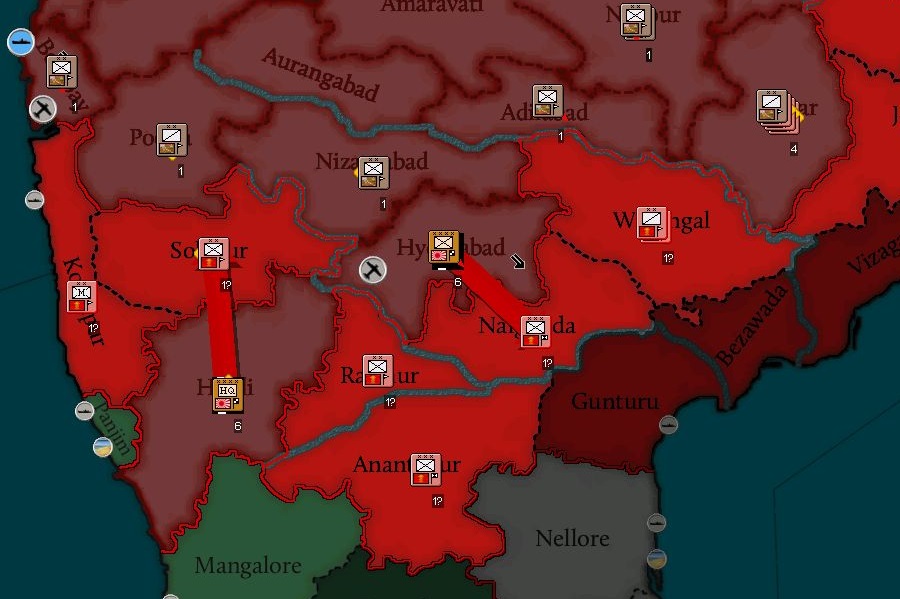 The Bhartiya attempted to keep fighting in regions other than these key cities, but there they found themselves cut off and unable to escape to the Bengal heartland of the Commune. 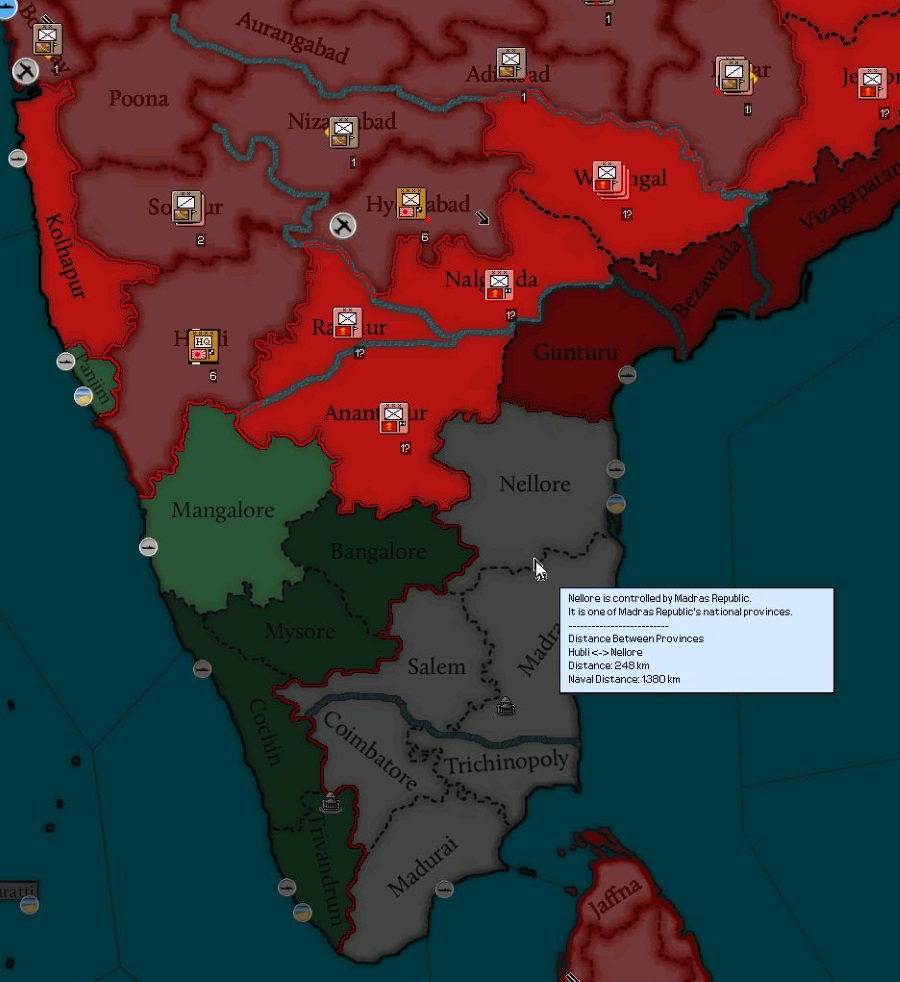 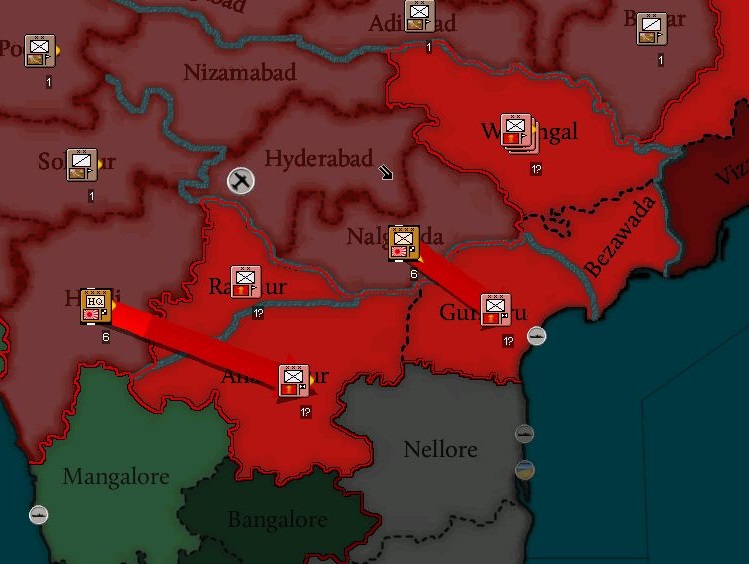 A consistent goal for the Entente was to push to the Bay of Bengal and separate the Bhartiya from their ally in Travanacore, and to surround the neutral Madras Republic and prevent them from attacking or being attacked by the Bhartiya. Delhi, after all, had designs on the whole of India. 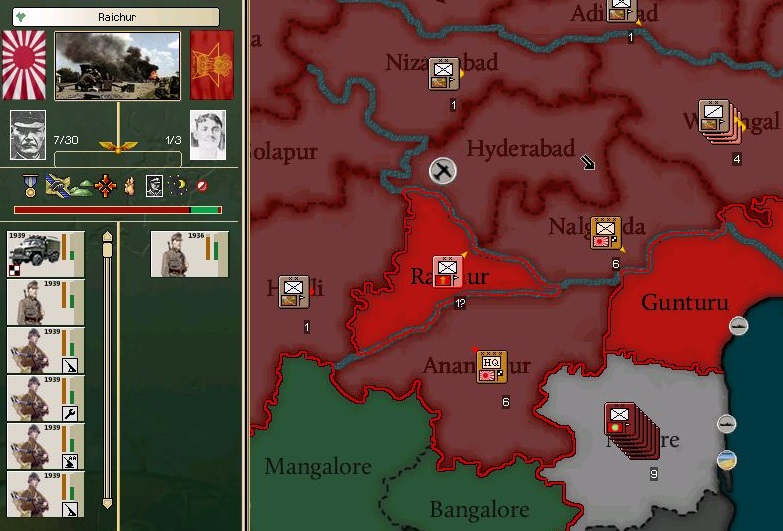 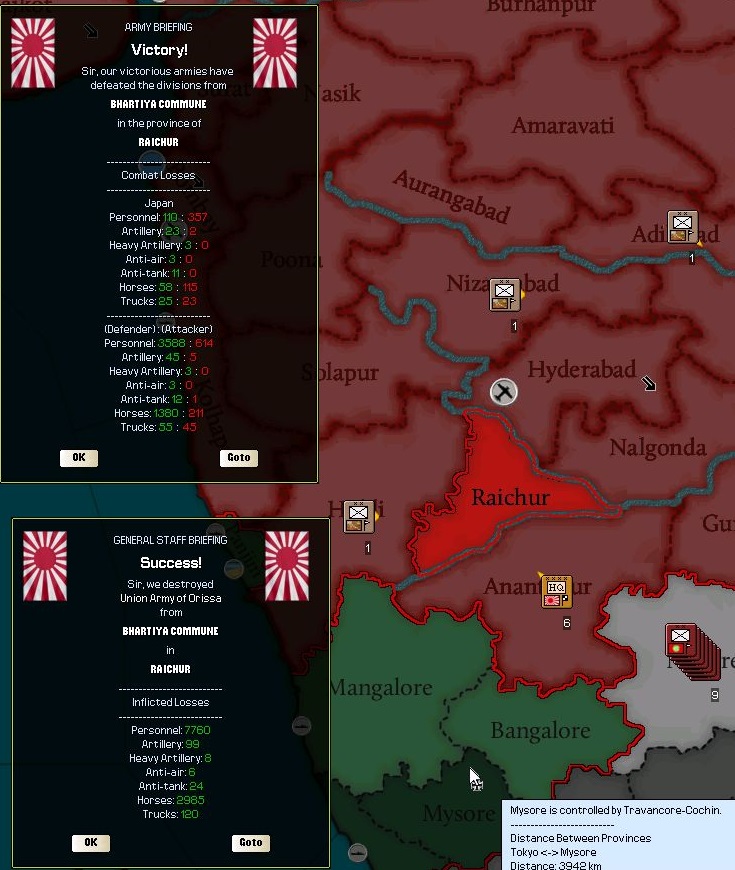 JEF-India allowed for the encirclement and destruction of several Bhartiya divisions, giving Delhi a concrete advantage which had been elusive in the months before their arrival. 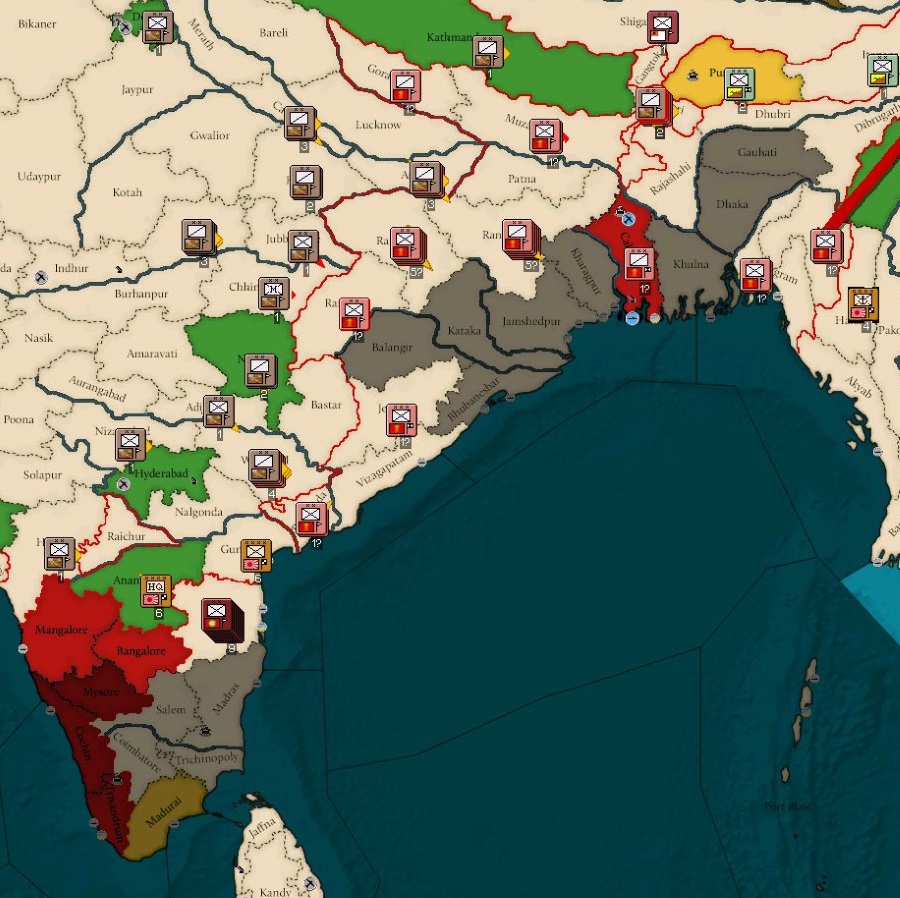 Before JEF-India was even able to redeploy for a northeastern attack, Delhi cavalry was already pushing into the lightly defended southwest corner of the Bhartiya heartland. The Commune’s days were numbered, and it was a good thing, as the Japanese divisions were bound to be required on another front. ~*~*~  Outside of South and Southwest Asia, the world war was going badly for the old monarchies of Europe. The Arab bloc decisively defeated their Ottoman foe. 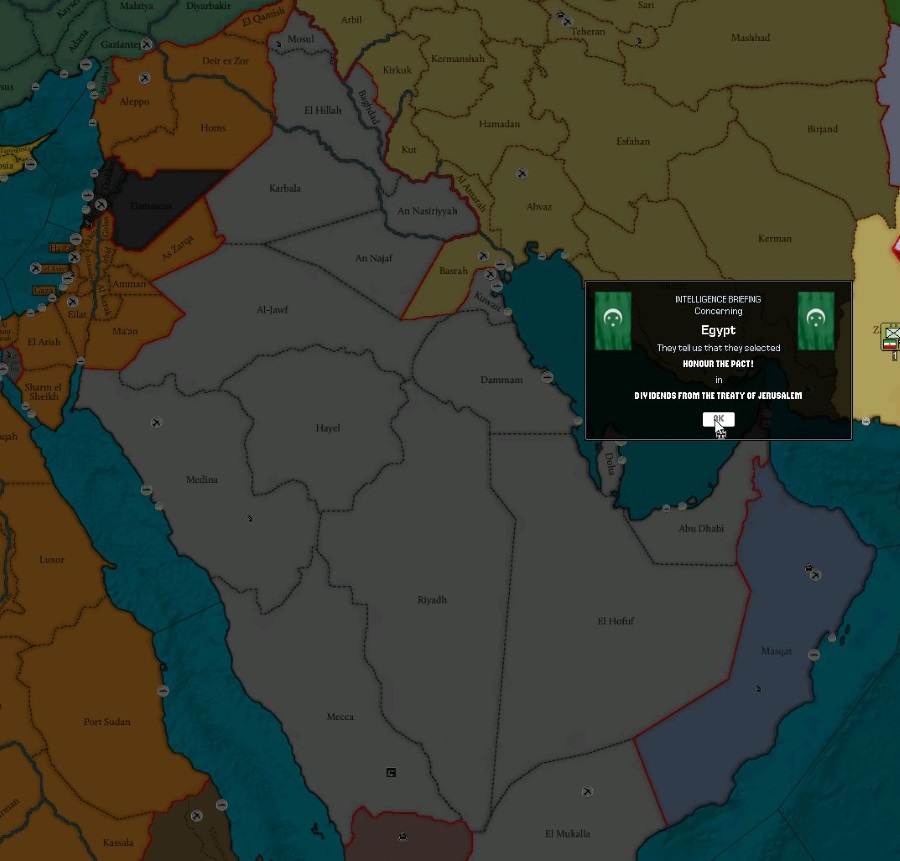 The allies of Egypt and Arabia divided the spoils among themselves peaceably and did not, as many expected, begin to fight one another. 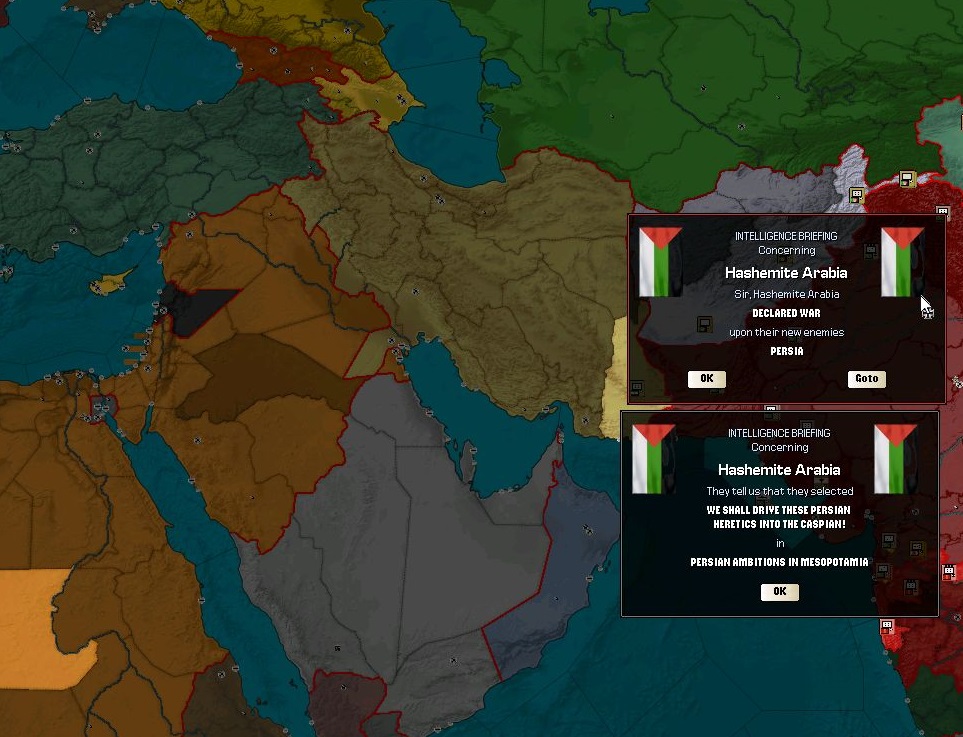 This was good, for the bloc quickly found themselves embroiled in war with Persia over that nation’s occupation of territories claimed by Hashemite Arabia.  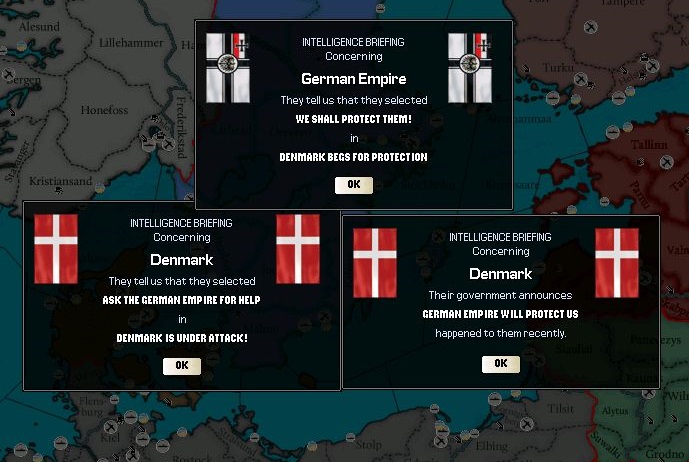  The Ottoman Empire, after being thrashed in their war with the Arabs, would decide to join Mitteleuropa and agree to help push back the syndicalists who seemed likely to conquer the whole of Germany. They joined Bulgaria and Denmark as new members of the alliance.  Unfortunately, Denmark did not last very long.  To the surprise of nobody, the entry of the Ottomans did very little to stem the French advance, which captured Berlin in the winter of 1939.  In fact, the entry of the Ottoman Empire served only to anger the war-weary population, which supported a republican coup that ended the sultanate after six and a half centuries.  With Turkey in chaos, there was also nothing to stop enosis between Greece and Cyprus, as any regional power that would have once objected was now in chaos or gone.   France was destined to be the greatest power on the European continent, but they also treated their allies well, granting independence to Luxembourg and handing over Flanders to the Netherlands. 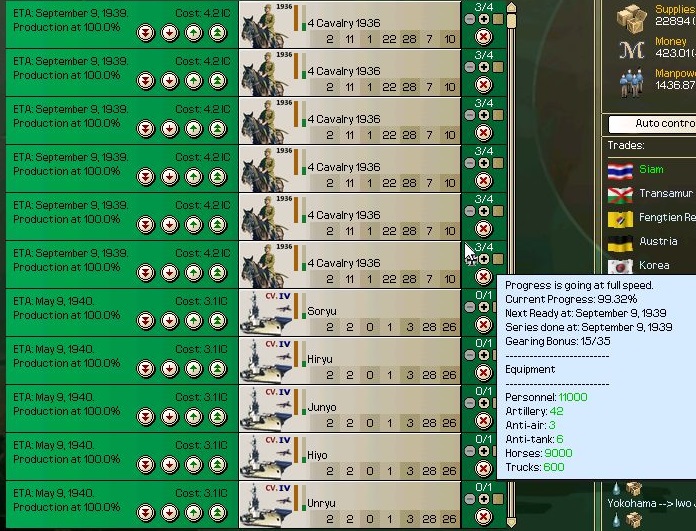 The Japanese Empire, the Sphere, and the Entente in general was in a new threat environment. The main foes thus far had been the colonial German forces, the Qing Chinese, the Combined Syndicates and the Bhartiya Commune, none of which were particularly advanced militaries. 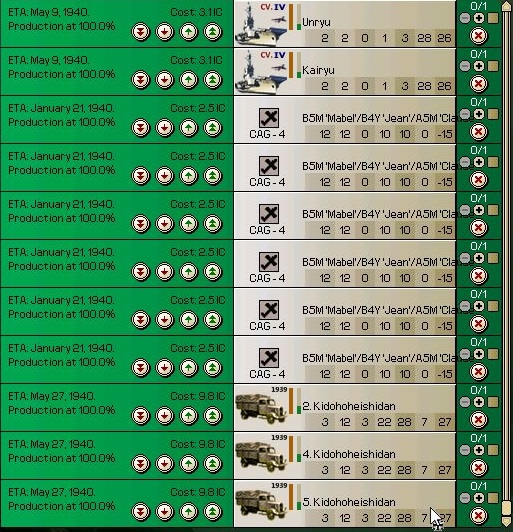 Thus, the Imperial Japanese Army increased their orders for trucks, eager to establish a truly motorized and mobile force in accordance with the doctrines of Koji Sakai. 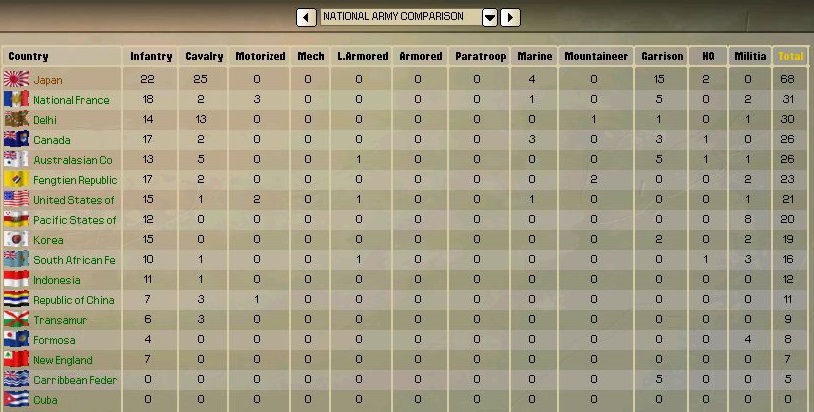 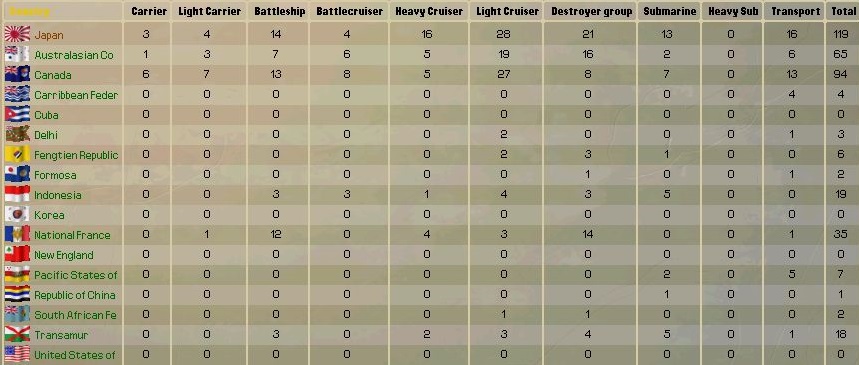 The Entente was growing in members, though individually most of its members did not have the largest militaries in the world. Japan and Canada were both great naval powers.  However, neither one could match the Republican Navy on their own.  And if Britain were to be defeated, the Communal Army on the continent would continue to control Europe proper, preventing the exiled French government in Algiers from returning home.  And beyond all of this, the Russians menaced both power blocs. Their large army had the potential to tip the balance decisively against either of the two power blocs. STRATEGY VOTE: The Invasion of Britain 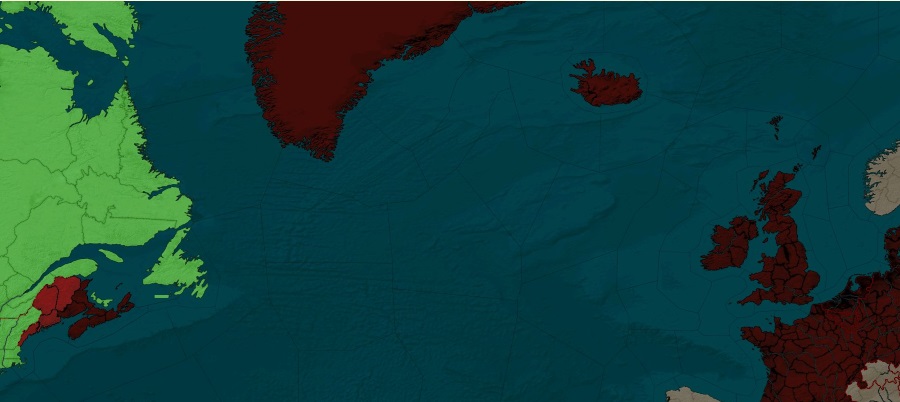 PROBLEM: The Republican Army had made a continuous nuisance of itself in the Atlantic provinces of Canada, but with the Combined Syndicates defeated, it should be no trouble for the combination of the Royal Army and JEF-America to destroy them once and for all. It is the opinion of Entente intelligence that the British forces in Atlantic Canada represent a large portion of their entire army, and so the natural question is whether the destruction of this force should be followed by an attempt to invade Britain itself. Such an operation would follow the capture of Greenland, which France took control of after Denmark’s surrender, and the liberation of our ally Iceland from syndicalist control. Once Iceland is under control then it would be possible to land in either Scotland or Ireland. Specifics of the invasion plan can be decided upon in the future, but for now the question is if and for when the Japanese military should prepare to invade Britain. It is currently January 1, 1940, and all above military estimates are current as of that date. Five new carriers will be operational by the end of May. Operations against German colonial possessions in Asia will continue throughout 1940, and the hope is that the Germans will be induced to surrender by the time this proposed operation against Britain would begin. Note: I would take military control of Canada for this so that I can run joint operations with both navies. Option A: Invade by the Autumn of 1940 quote:”The British Army will be weak once we smash them in Nova Scotia, and we must follow up this success by invading Britain. Doing so would remove our greatest naval threat and secure naval dominance for the Entente in the Atlantic as well as the Pacific. We must do it as soon as possible.” – Hideki Goto, IJN Officer Option B: Invade by the Summer of 1941 quote:”We would be stretching ourselves thin with this timetable. We need more transport vessels, more planes, more marines, more everything! If we rush this operation and our navy is destroyed at the hands of the British, then all of our successes could be undone.” – Hiroshi Sanada, IJN Officer Option C: Wait & See/Do Not Invade Before 1942 Another vote would occur in the future where we could decide what to do. This does not exclude invading Britain, only for 1940 and 1941. quote:”Caution, caution, caution! What is the great rush to attack Europe? We should take our time consolidating control of Asia and America, and then examine the situation then. We should build more carriers, allow the Chinese time to build a large military, and wait to see if the Russians and syndicalists end up at war. Committing to an invasion at any time before 1942 is a needless risk and would only expose the Entente.” – Shinzo Makabe, IJN Officer
|
|
|
|
C, no need to rush off and overextend ourselves. Let's police up the rest of Asia, get the Entente and all its new members back on their feet, and deal with Russia first. Also this war needs to last long enough that it ends in mushroom clouds 
|
|
|
|
Option A With the defeat of Germany so near we need to strike while the iron is hot before the European Syndicalists become too strong. Give them enough time and the combined industrial might of a post-Germany Syndicalist Europe will be too much to defeat.
|
|
|
|
Option B Invading Atlantic Canada just in time for winter is a dumb idea.
|
|
|
|
CB. Let's focus on our own sphere and own interests.
|
|
|
|
CB.
|
|
|
|
A, B We must end the Syndicalist naval threat as soon as possible.
|
|
|
|
A: You know that saying, 'Never invade Russia in Winter'? It does not apply to Britain. Their climate is mild, like their people.
|
|
|
|
A, B Crush their own landing force, then fight them on their beaches and in their cities
|
|
|
|
B.
|
|
|
|
B
|
|
|
|
B we should wait until the new Soryu class carriers are completed because although the AI is very dumb, the UoB navy has a fair amount of naval aviation assets.
|
|
|
|
A, B Germany's crumbling like a house of cards, so we'd better get a move on and strike before France can essentially stop giving a poo poo about the mainland and fully concentrate on sticking its nose in our Britain business. I mean, sure, there's a contingent alliance carpet going from Germany to the Don-Kuban Union that could keep them busy in theory, but that's not going to be an issue given the way France has overrun Germany.
|
|
|
|
|
C, B
|
|
|
|
A, B. It is very doubtful that the Britons will have the manpower or discipline to resist an invasion after losing their expeditionary forces in the Americas, it is time to restore the United Kingdom.
|
|
|
|
B, A
|
|
|
|
A,B Gotta keep the momentum and invade before the British can regain their forces and the French send troops to help them.
|
|
|
|
A. Britain has never been a land power, so once their forces in Canada have been smashed their islands will be defenceless.
|
|
|
|
A, B We must strike before they can consolidate their gains! As soon as the new carriers are deployed, let the invasion commence.
|
|
|
|
Keep the democratic pain train rolling! (A)
|
|
|
|
B. I'd prefer to see a little more done to ensure other fronts are closed and other allies have time to organize themselves before we embark to Britain, but the longer we wait, the longer they have to rebuild.
|
|
|
|
https://www.youtube.com/watch?v=6aejTPnAoyk
|
|
|
|
B, C. We can't let this opportunity slip by, but... we haven't really done an amphibious attack on this scale yet. We've barely made any amphib landings at all, most of our invasions have been via friendly ports. If we just bullrush into this we risk losing our momentum and a LOT of our most experienced and well-equipped troops. Let's prepare properly for this thing.
|
|
|
|
C
|
|
|
|
B, C Invading is probably a good idea, but doing so before our army is prepared to go to toe-to-toe with heavily mechanized Internationale forces would be disastrous.
|
|
|
|
Voting Finished! First Round Results: Option A (Invade in 1940): 10 Option B (Invade in 1941): 8 Option C (Do Not Commit): 6 Of the 6 C voters, three had no second preference and three preferred B. Final Results: Option A (Invade in 1940): 10 Option B (Invade in 1941): 8 + 3 = 11 Option B wins!
|
|
|
|
Part Fourteen: Face the Halifax (January – May 1940) 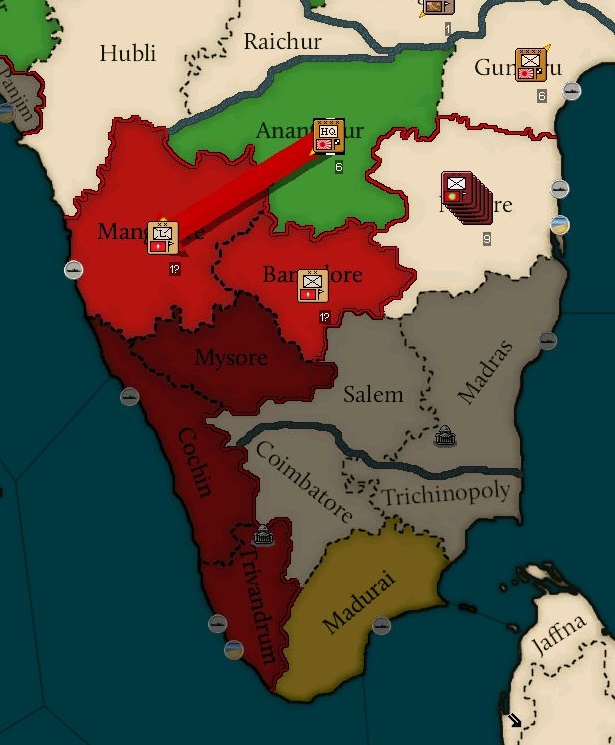 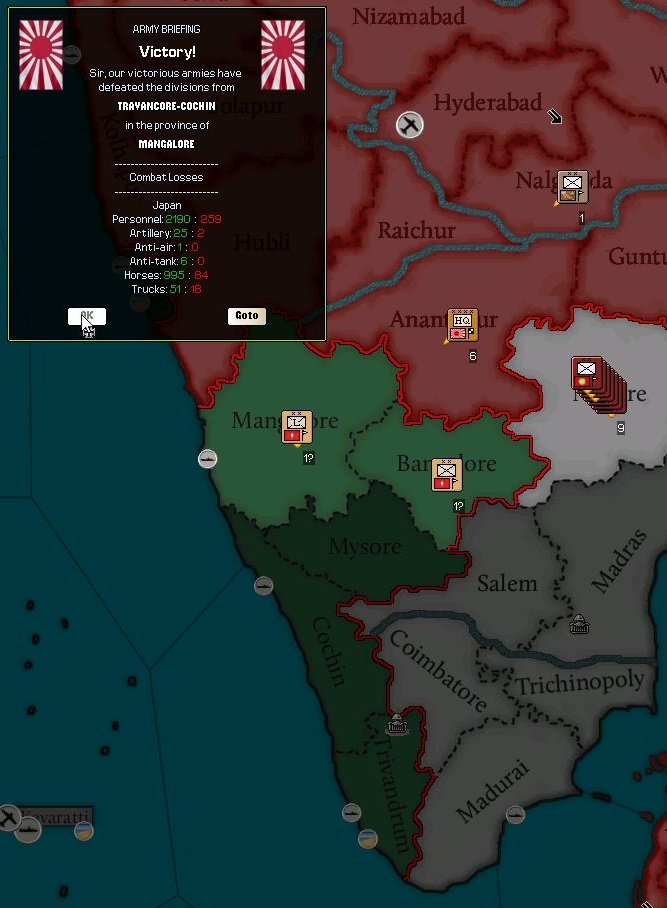 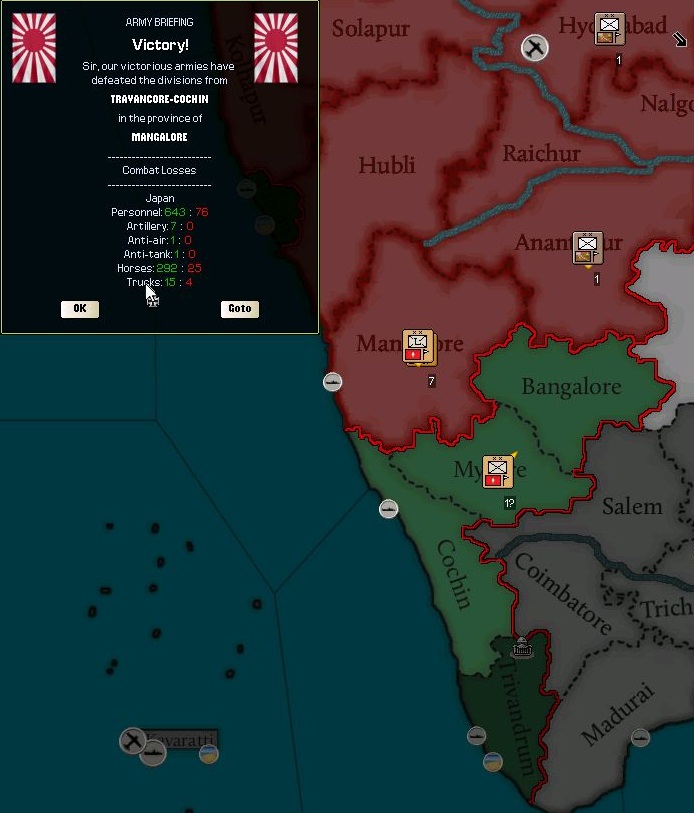 While the decision to not invade Britain in 1940 gave the Japanese more time to handle other fronts, there was still a desire for hasty victories to keep up public morale. The state of Travancore-Cochin had barely had time to truly get established before the war had begun, and so it was an easy target for the Japanese to snuff out. 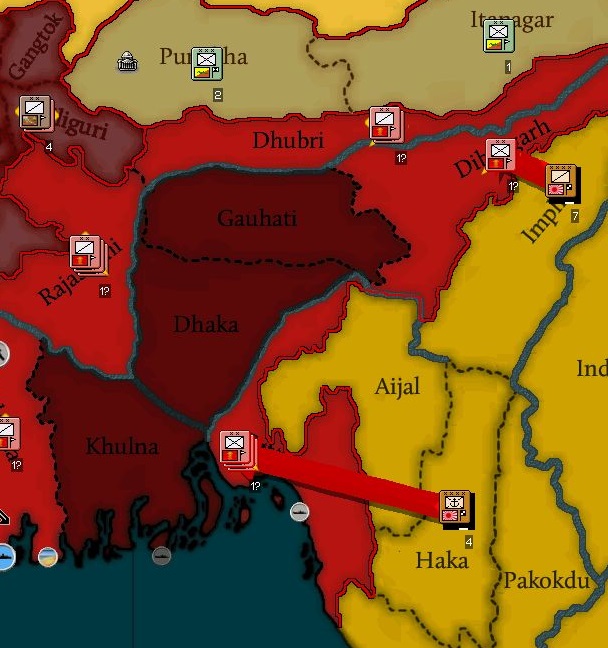 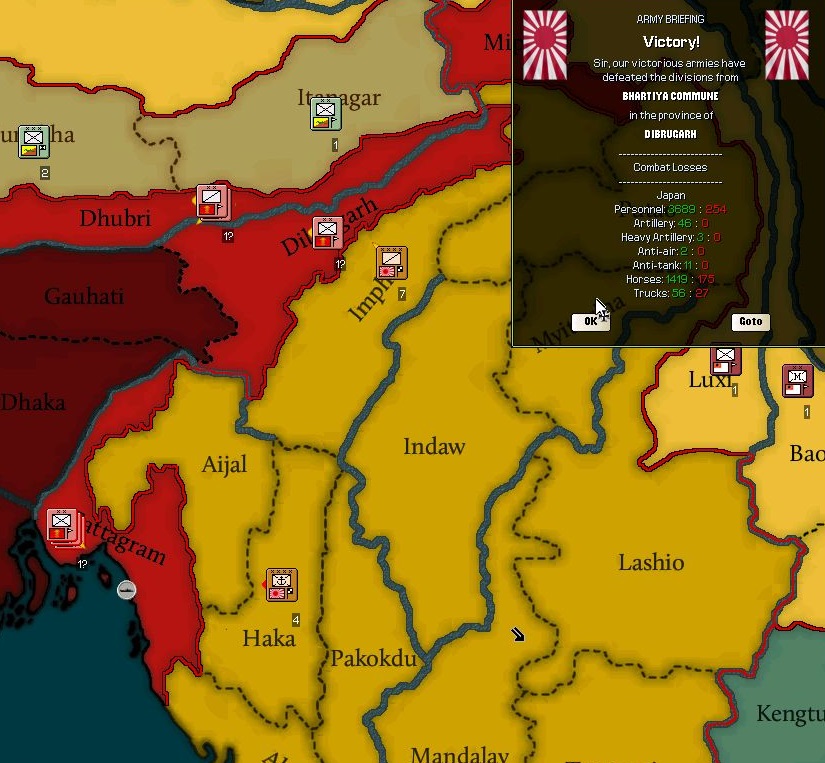  The more serious threat was certainly the Bhartiya in Bengal, and most of the Japanese forces were engaged against them. 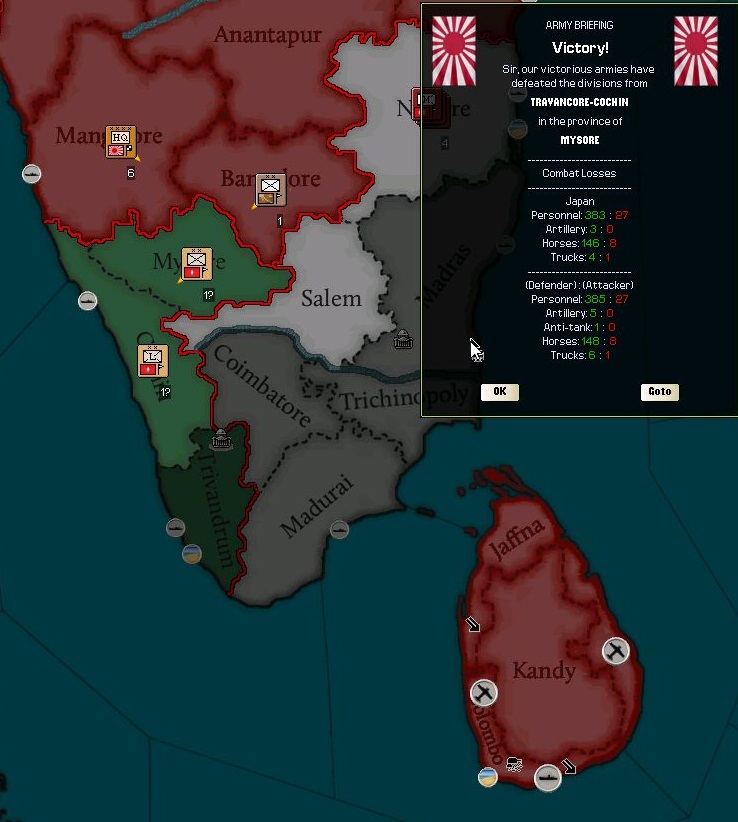 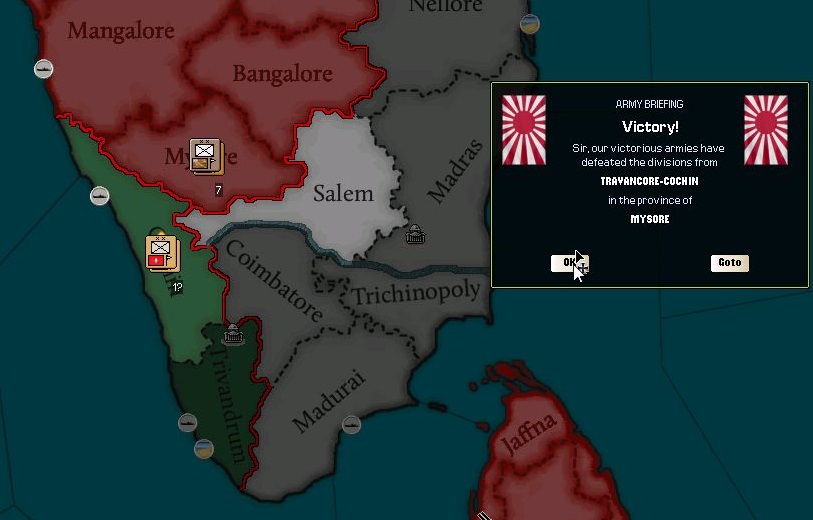    However, a full six divisions were dedicated to ending the southern ally of Calcutta, and while the surrender of Travancore-Cochin was to Delhi, the Japanese treated it as though it was almost entirely their victory. 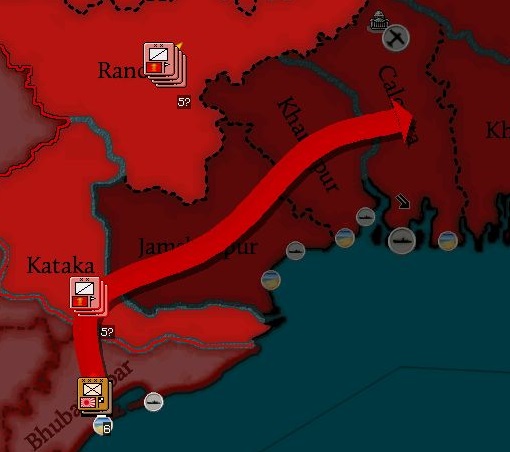 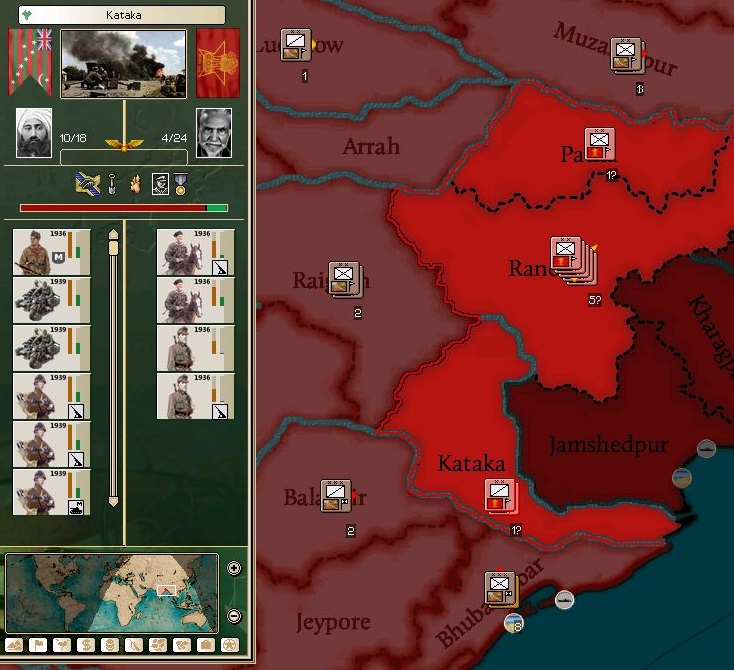 With the surrender of the syndicalist sin the south, only the Bengal heartland remained, and Japan would initiative the critical Battle of Cuttack, which would prove to be the last effective stand of the Bhartiya. 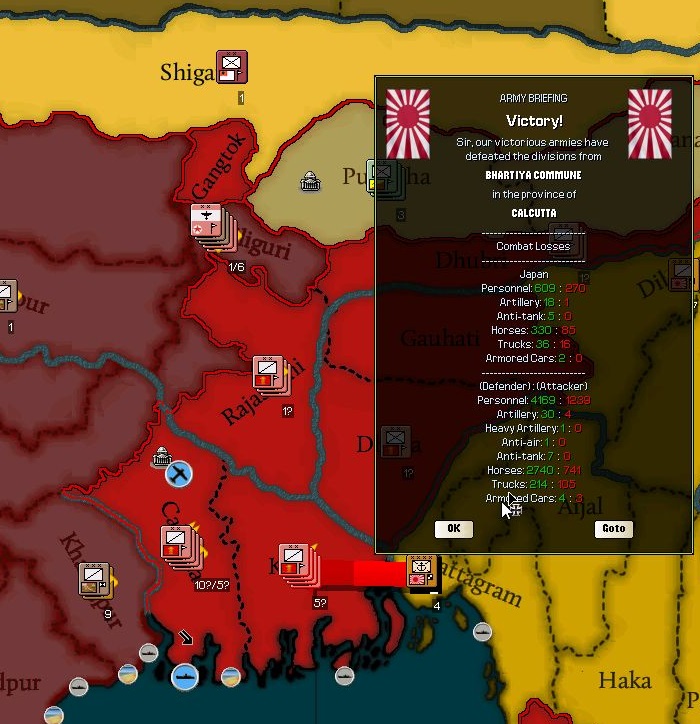 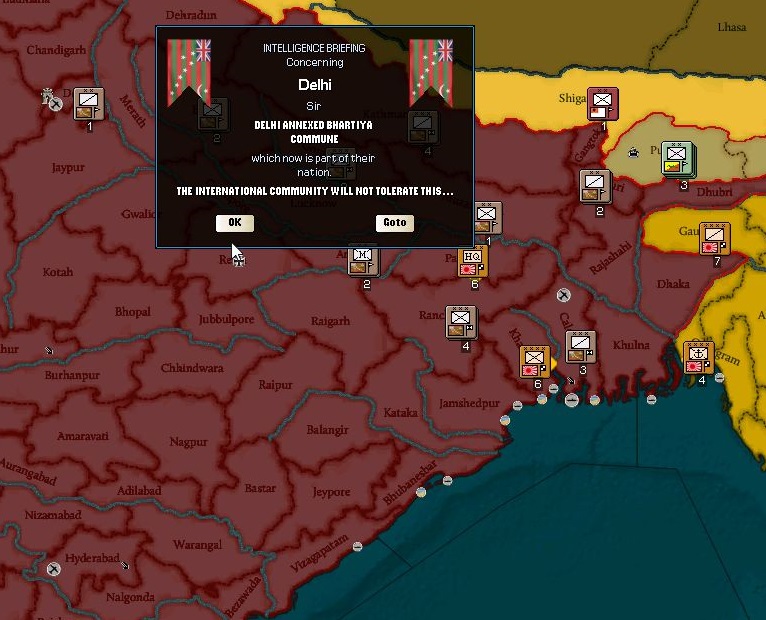 The Bhartiya were forced to retreat from Cuttack, and their retreat would not stop even in Calcutta. The capital of the Bhartiya Commune fell almost anti-climatically, and with it fell the Commune. 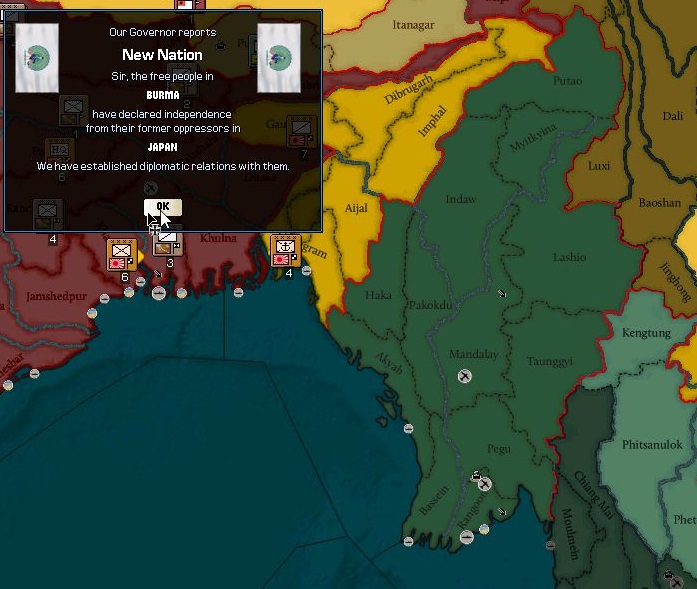 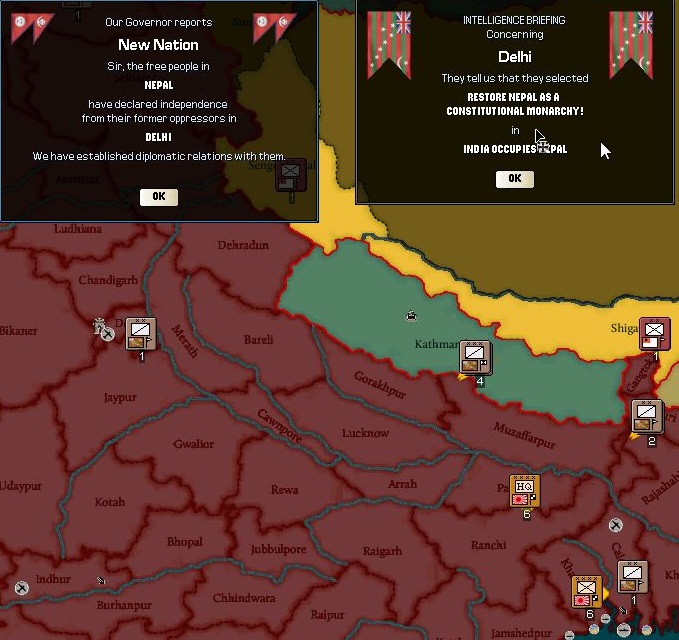 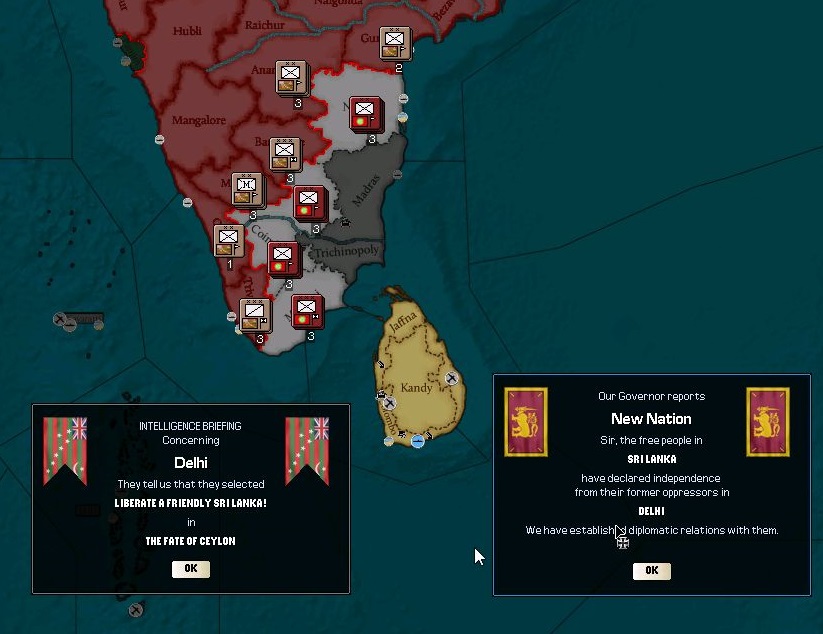 The end of the war in India allowed for the re-establishment of Nepal and Burma, as Indian and Japanese clients respectively, as well as the establishment of an independent Sri Lankan state, also under Indian control.  Japan had committed 23 divisions, 12 infantry, 7 cavalry and 4 marines to the Indian War, and their intervention had surely been vital to the success of Delhi. It is unfair to say that Delhi could not have won without Japanese help, but certainly they could not have won so quickly without Japanese help. With the job done, the divisions began a long march to Rangoon, where they would be redeployed elsewhere.  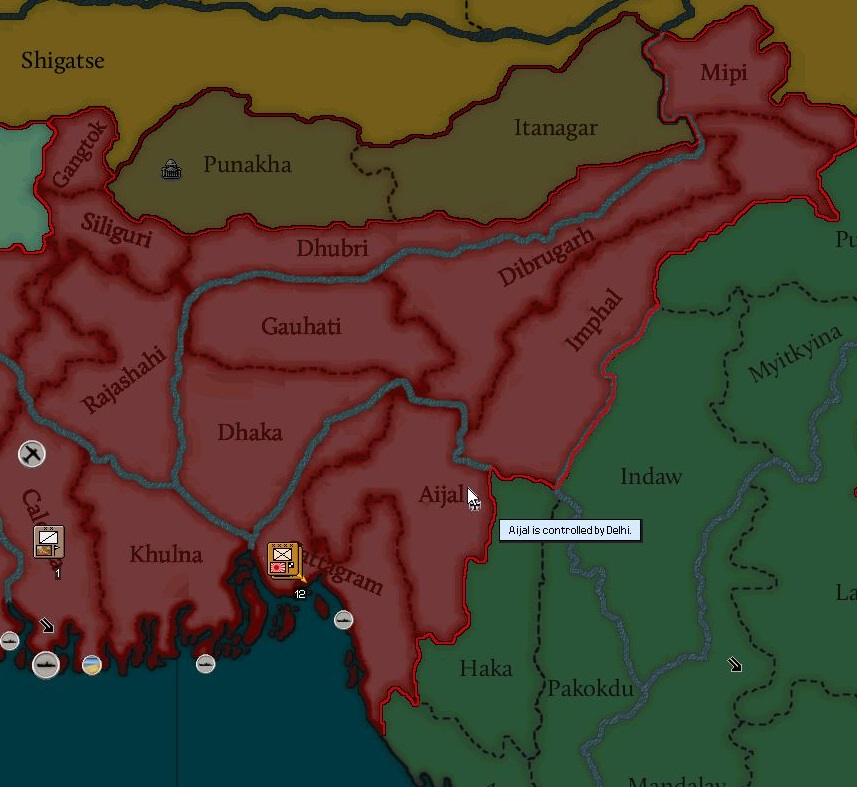 The Japanese also handed over all territory in Bengal to the sovereignty of Delhi, ensuring a cooperative relationship between the two allies in the future wars to come. 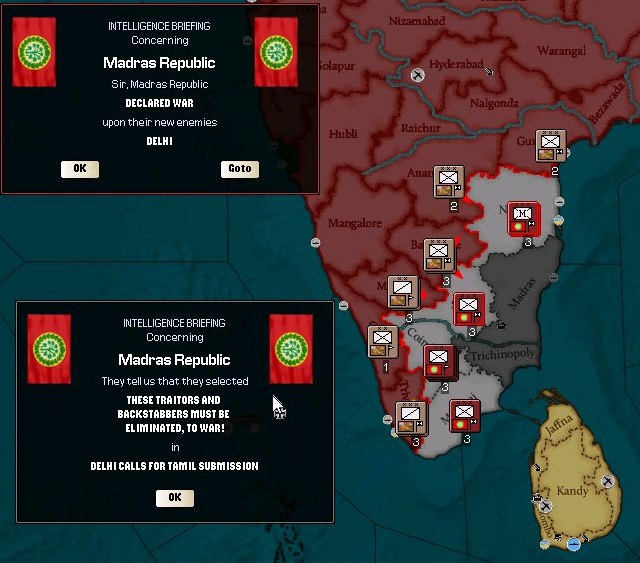 The only challenge remaining to Delhian dominance in India was the Madras Republic, and they had foolishly refused bend the knee. 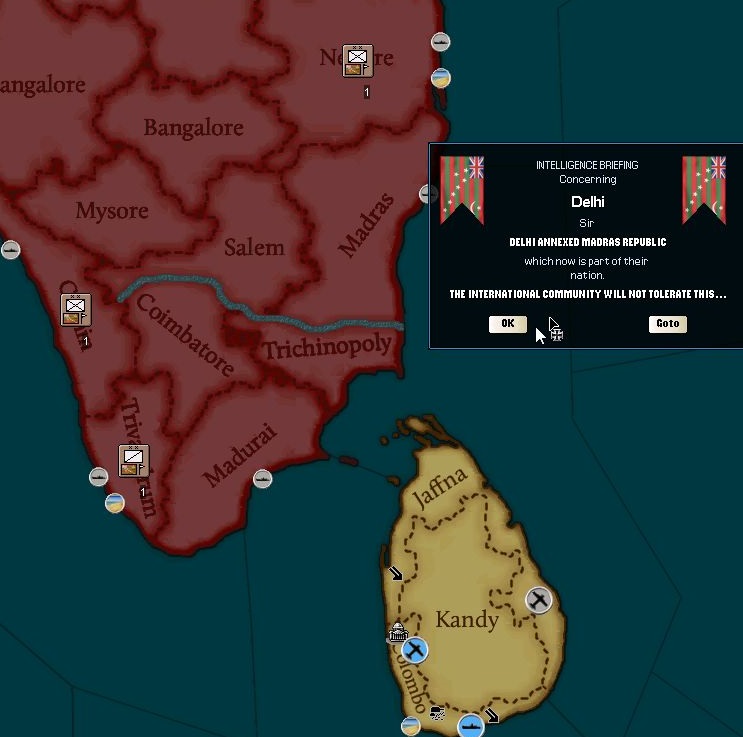 Japan declined to divert any of its forces south to help Delhi, and Delhi did not need their help. A climactic battle in Madurai represented the last bastion of India outside of the Entente, and Delhi forced their surrender after a month. India was united and independent, and its tremendous population was on the side of the Entente, something that was bound to be of great benefit in the coming years. ~*~*~ New Guinea had been a source of annoyance and embarrassment to two of Japan’s allies. Japan had elected to focus first on Burma in order to help save Delhi from syndicalist invasion, and then on Borneo in order to secure the vital shipping lanes in the South China Sea. Throughout this entire time, both Canada and Japan leaned on Australasia to handle the New Guinea situation. They had hedged repeatedly, and finally Japan elected to deal with it themselves. 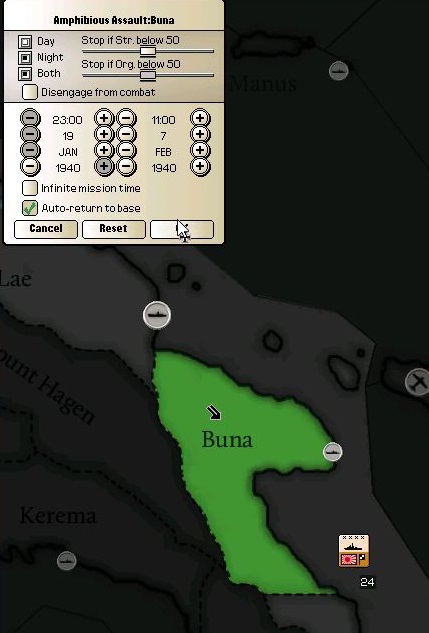 The invasion of New Guinea began with a landing near Buna in the (de jure) German portion of the island. 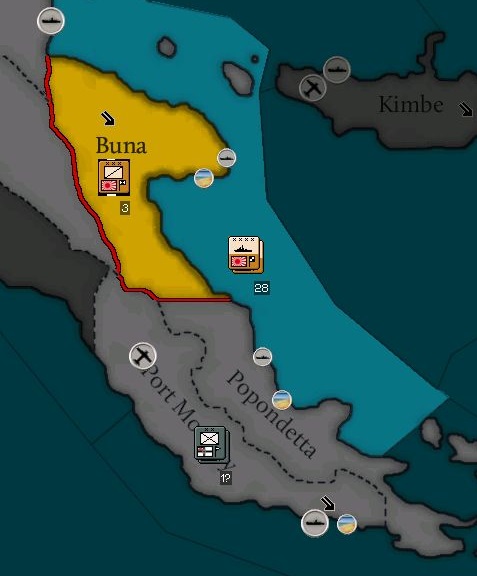 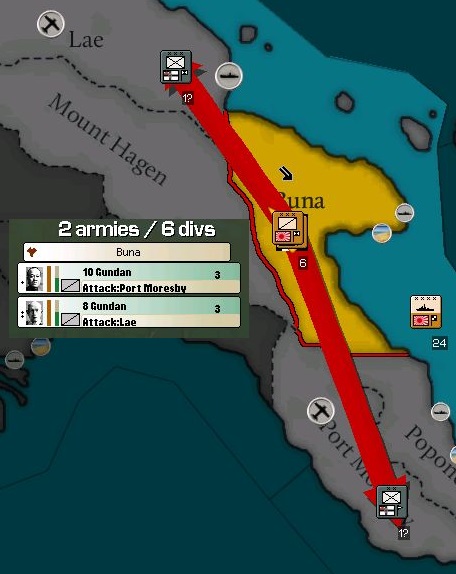 The Japanese cavalry which had invaded Borneo were re-assigned to the invasion of New Guinea. 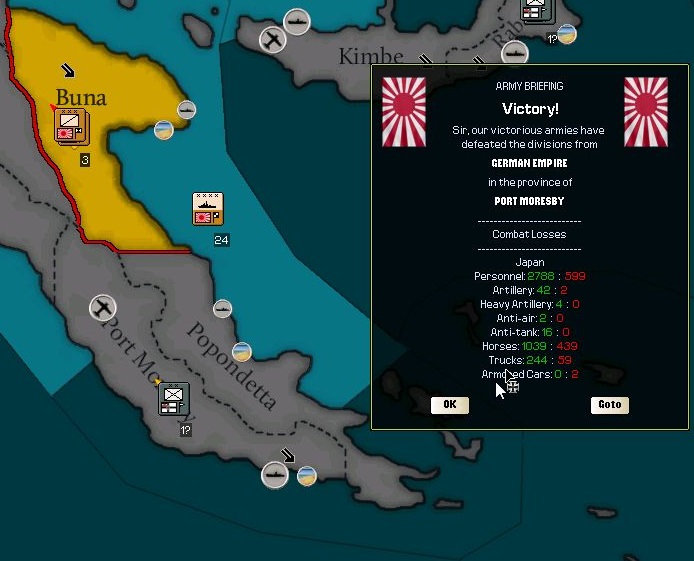 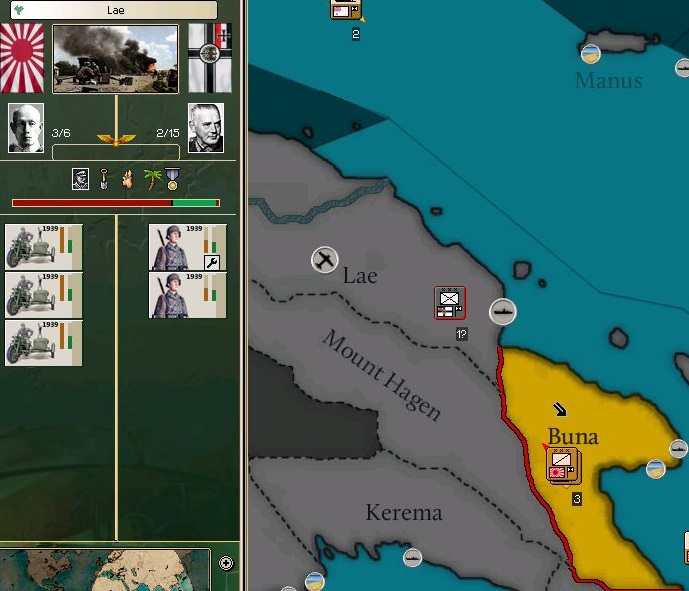 The location of Buna allowed for the landing cavalry to immediately assault the two most strategically important cities on the island: the Australasian port and airbase of Port Moresby and the capital of German New Guinea in Lae. 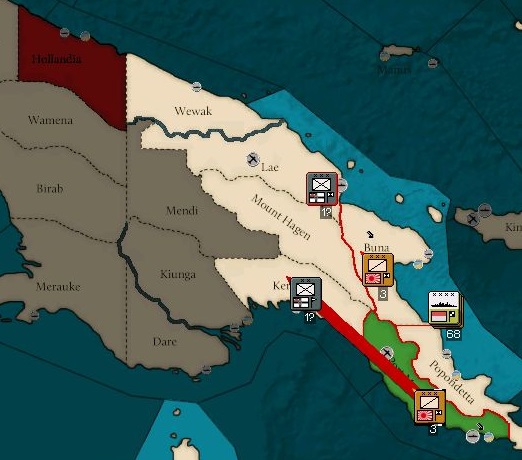 The capital of the Indonesian province of New Guinea was important in the sense that it needed to be retaken in order to re-establish Indonesian control of their land, but it was not as strategically important as Port Moresby or Lae, as it had no large port facilities or an airfield. 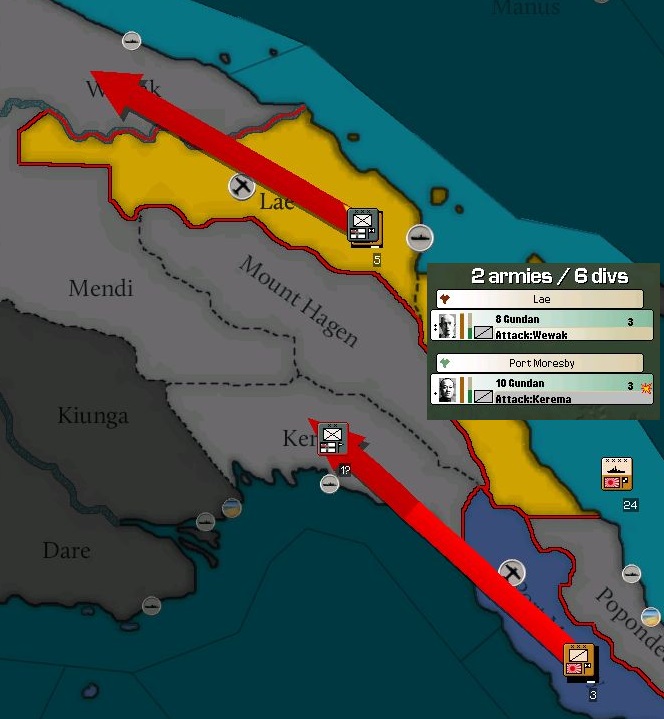 With the two of the island’s three regional capitals taken, the Japanese turned their attention westwards. 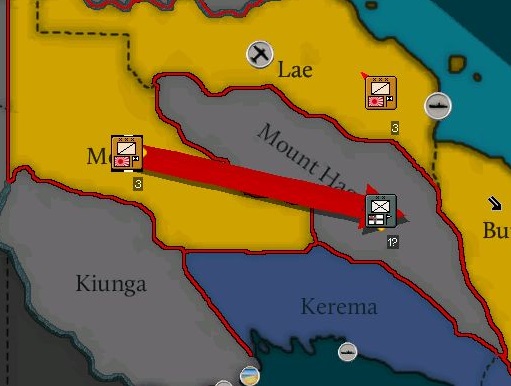 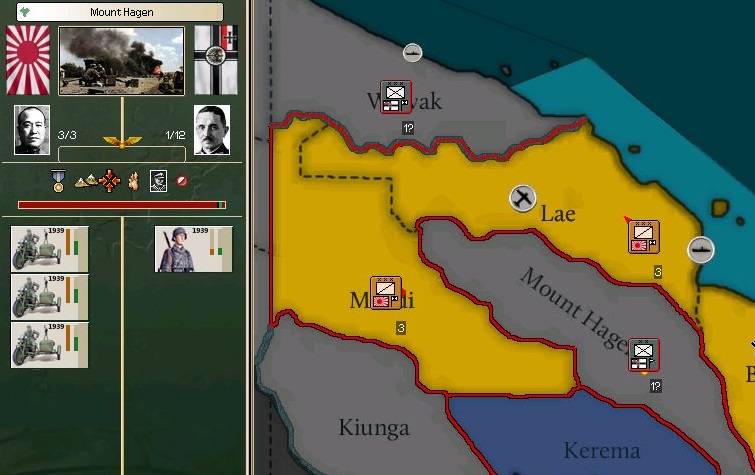  Apparently, the Germans on New Guinea learned nothing from Borneo and also attempted to retreat further inland, but were, just like the Germans on Borneo, overrun by the rapid Japanese cavalry. The presence of cavalry was a good thing because the island was large and had poorly developed infrastructure, and so it would take a time before the island was fully reconquered. Nevertheless, the two major airfields were taken and half of the German garrison had surrendered. The true battle was effectively over. ~*~*~   Despite the surrender of the Reed regime, there was still a good amount of fighting left to do before North America was secured. British and Dutch forces were still operating in North America. The Dutch presence was wiped out only a few weeks after the surrender of the Reed regime. 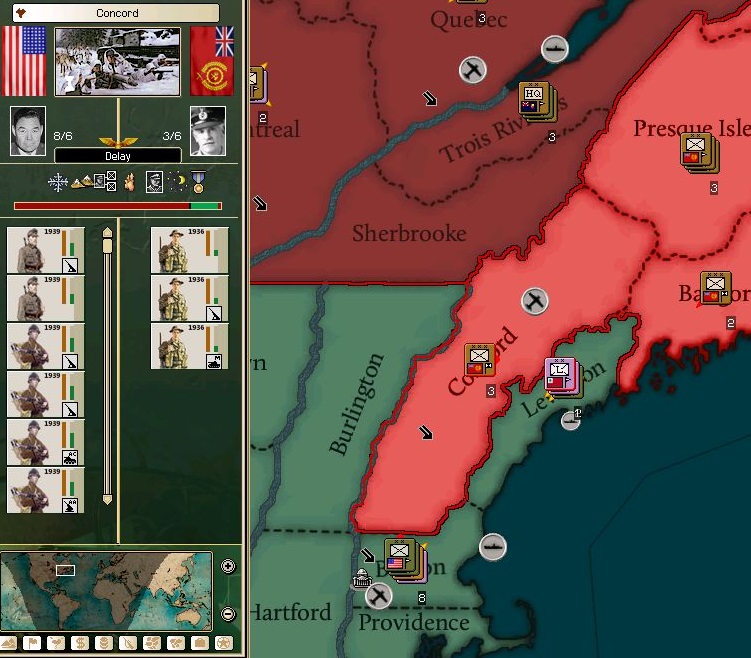 The British presence in Atlantic Canada had proved to be more enduring, having been reinforced with new divisions from the homeland. They had little chance of actually completely defeating the Canada in addition to the re-established United States and the Japanese Expeditionary Force, but the geography of the Atlantic Provinces meant that they had a few chokepoints they might be able to hold for a time. The British were a veteran and effective force, and so they did have some success in holding the mountainous regions of northern New Hampshire against a Japanese-American attack from Massachusetts. 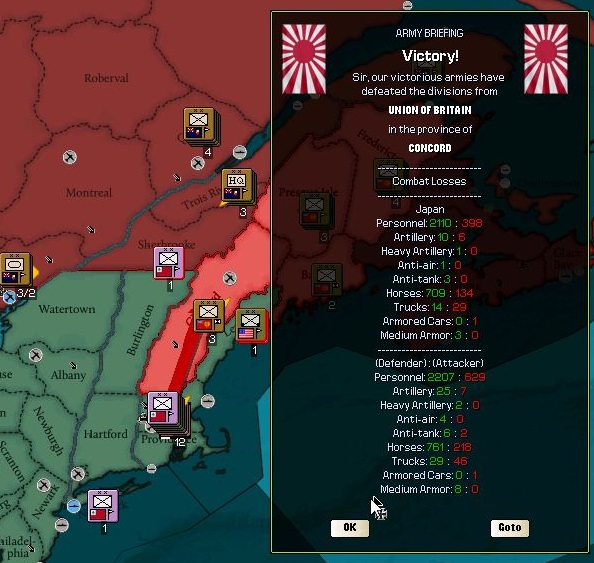 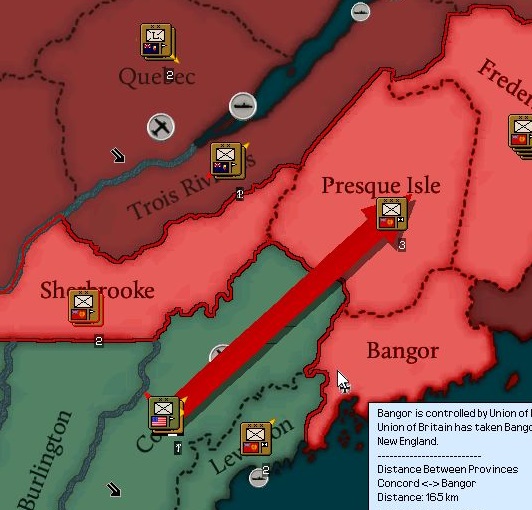 The sound tactics of the British were not enough to make up for the growing numerical advantage of the Entente in North America and so the Japanese-American attack seized New Hampshire and moved right on into northern Maine. 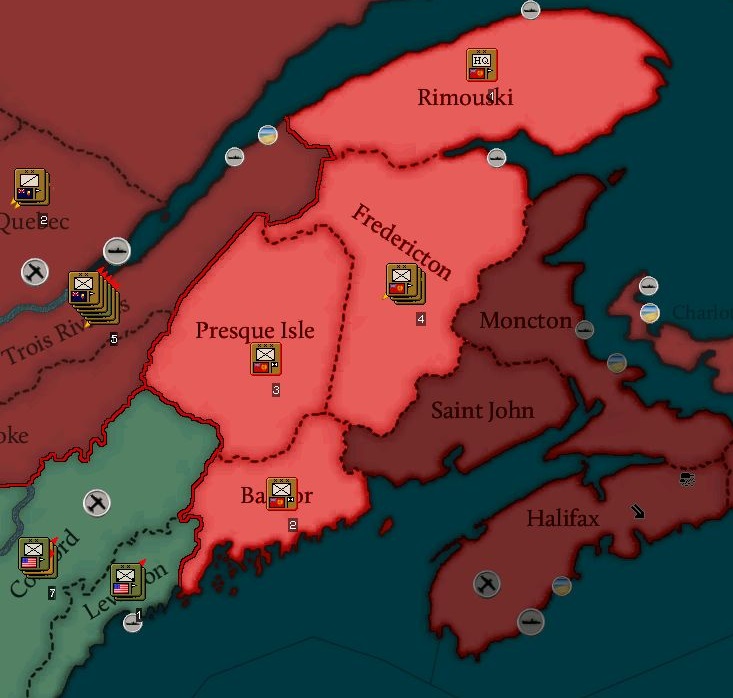 The province of New Brunswick had, in a relatively short period of time, been taken by the British, retaken by the Japanese, retaken by the British, and was now about to be retaken by a Canadian-Japanese assault. Considering this flurry of activity, the province was suitably devastated. 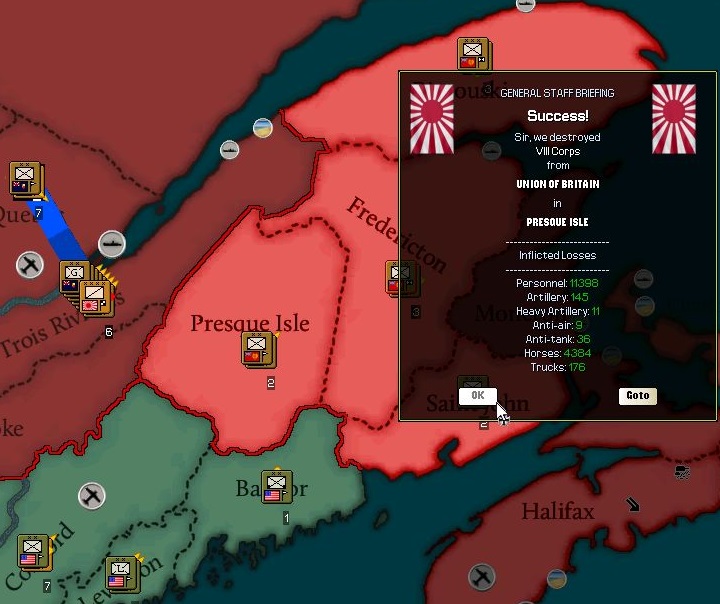  The British effort to supply their invasion force in Canada and Maine had been taxing, and many of the frontline units had not been properly supplied, and so more than one unit surrendered without even retreating to the potential stronghold of Nova Scotia.  For what would hopefully be the final time, Entente forces entered the province of New Brunswick, forcing the British to retreat to the southeast from Fredericton. 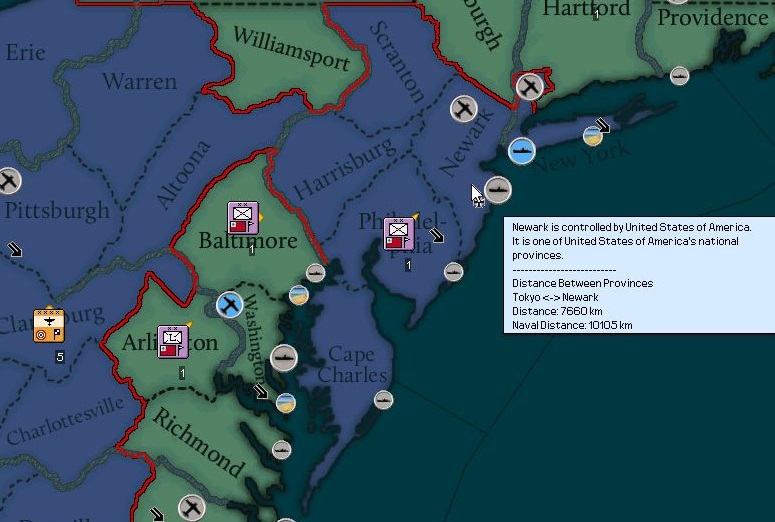 The British being evicted from Maine and the Dutch from Florida meant that the fighting on American soil was over, and so the three Entente governments which occupied American soil could begin to figure out what their new arrangement would be. Negotiations for a permanent and comprehensive settlement did not begin at this point, but New England did agree to return New Jersey, Delaware and most of Pennsylvania back to the United States, as well as agreeing to putting New York City under a condominium between the states of New York and New Jersey. This effectively meant that the United States government could use New York City and its important port facilities to deliver war materiel to the east and what would shortly be the European war effort. 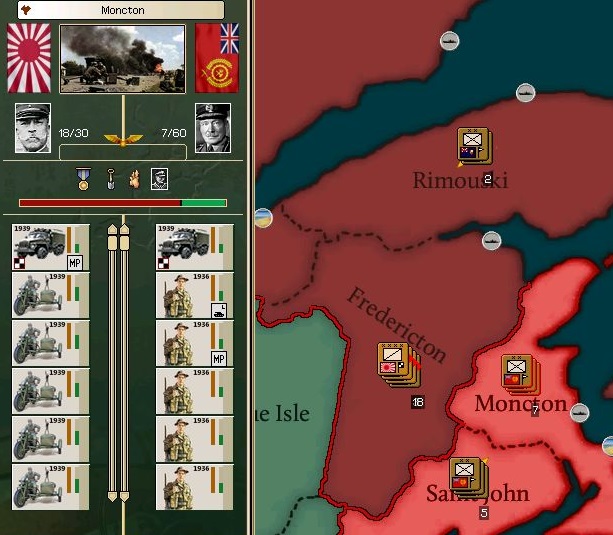 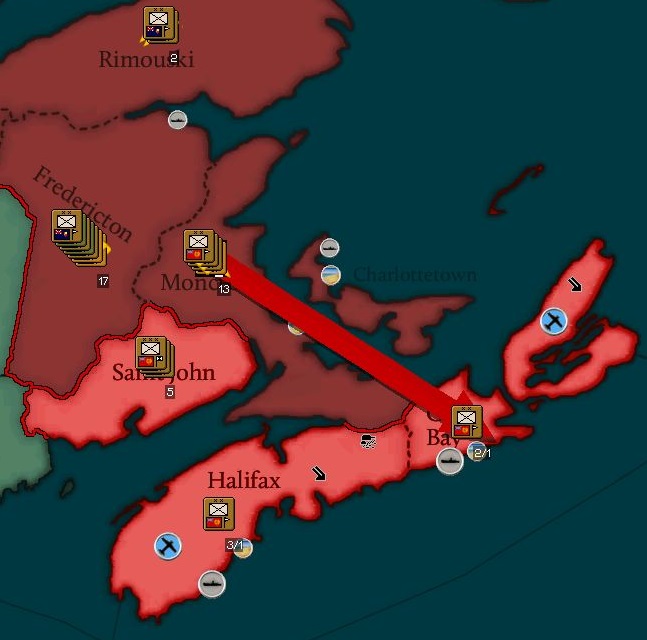 Japanese and Canadian forces funneled through the Moncton region, separating the five divisions in southern New Brunswick from their comrades in Nova Scotia. 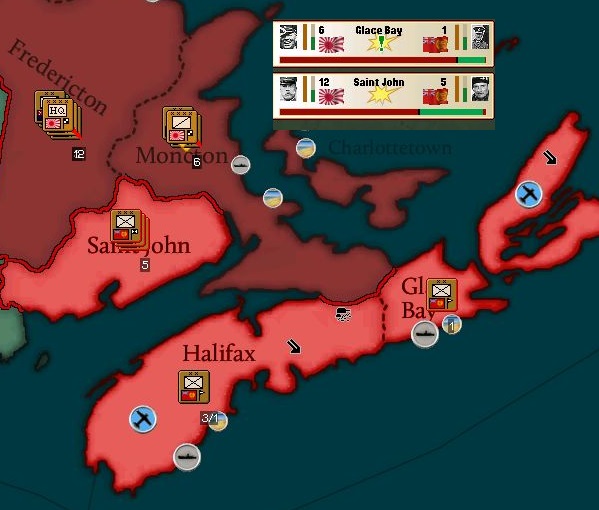 Prime Minister King did not wish for there to be an enormous bloody battle in the most important city in the Atlantic Provinces, especially if the Entente was going to be attempting an invasion of Britain, and so the Japanese cavalry moved to take northeastern Nova Scotia, and the Japanese infantry moved to eliminate the British infantry trapped in Saint John.  The loss of the divisions in Saint John was a major disaster for the British, which of all the great powers had the smallest army.  An attempt at a British counterattack against Moncton failed quickly, and the Entente took the time to move their forces into an optimal arrangement to take Halifax as quickly as possible. 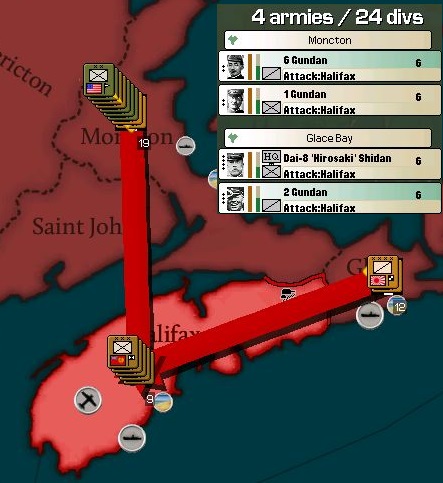 The Japanese were in position before the Canadians and Americans, and so they began the attack on the city without them. 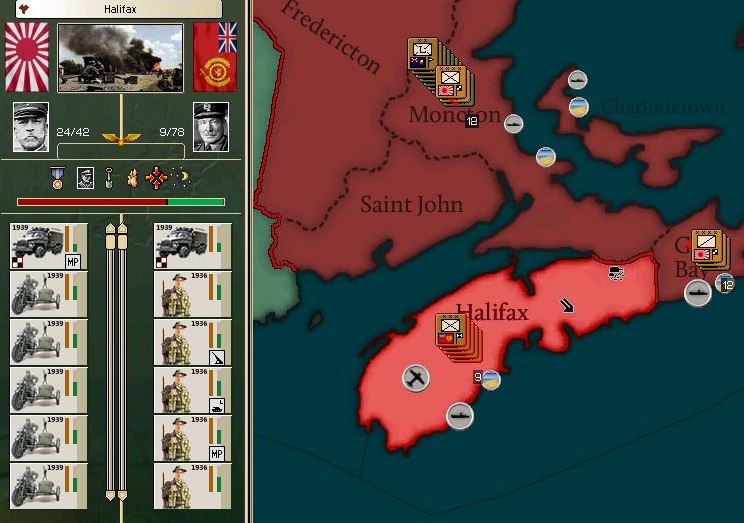 The British invasion of Canada, which had only been prevented from seizing Montreal and Toronto due to the timely intervention of the Japanese Expeditionary Force, came to an end in Halifax, as twelve Japanese cavalry and twelve Japanese infantry divisions assaulted the city. There was no bombardment from sea or air, as Prime Minister King was determined to protect as much of the port infrastructure as possible. 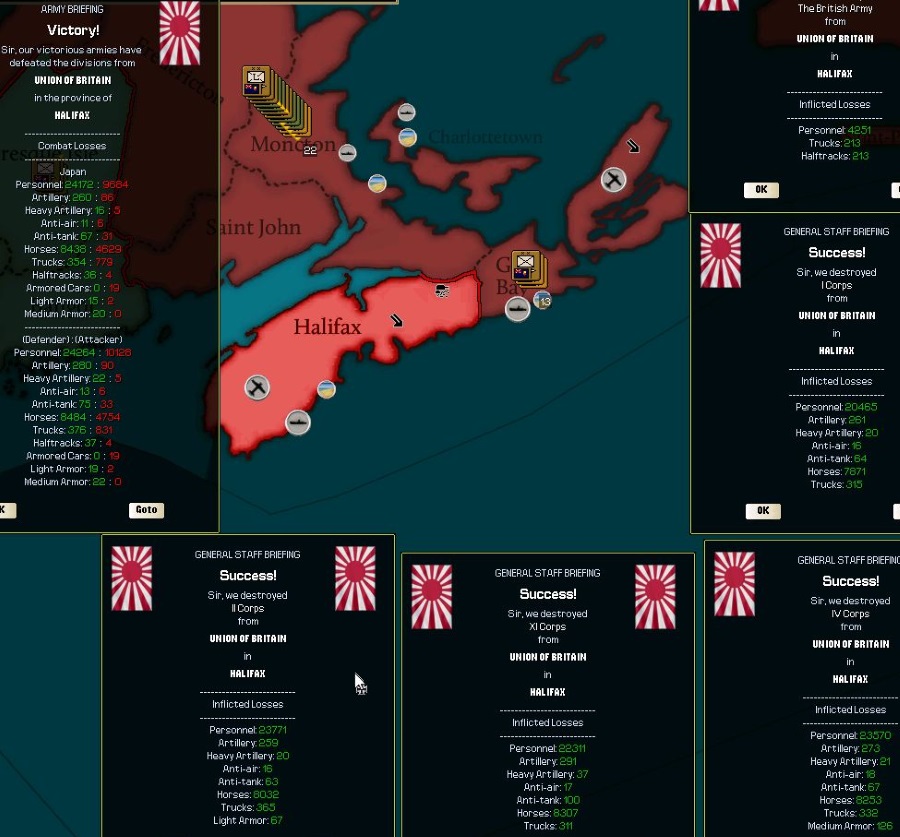 If the surrender of the British in Saint John was a major disaster, the Battle of Halifax was a cataclysm. 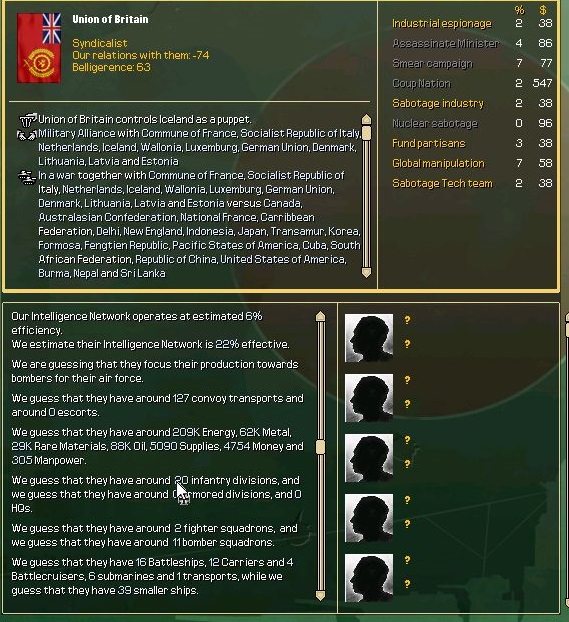 The British invasion of Canada was a gamble, which would have delivered the resources and industry of North America to the Internationale if it had succeeded. Instead it failed, and failed on an unprecedented scale. The British lost hundreds of thousands of soldiers in Canada, by some estimates almost three fifths of their army. Britain, as always throughout its history, would be safe as long as its navy could defend it, but they had failed to neutralize the Royal Navy and had done nothing against the Imperial Japanese Navy. The Republican Navy could still make a reasonable claim of ruling the waves, but the ability of Britain to engage in overseas adventure was completely shattered. ~*~*~  The Japanese High Command was extremely pleased to have finished the wars in North America and India, but those efforts would be nothing compared to the daunting task of liberating Europe from the syndicalist scourge. One of the very first things the Japanese military was going to need was a greater transport capability. They would have to deliver Sphere troops from Asia to Europe in large quantities and quickly. 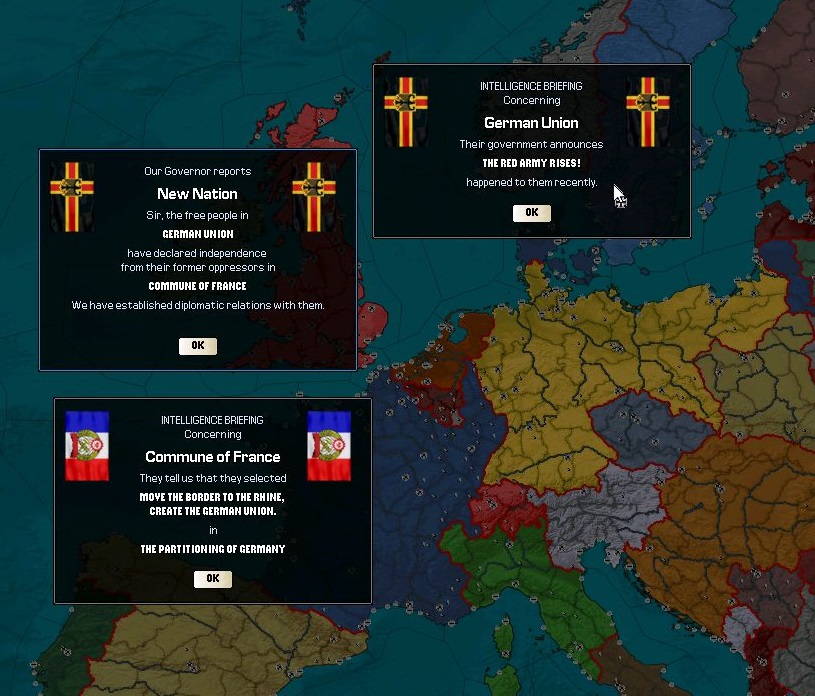  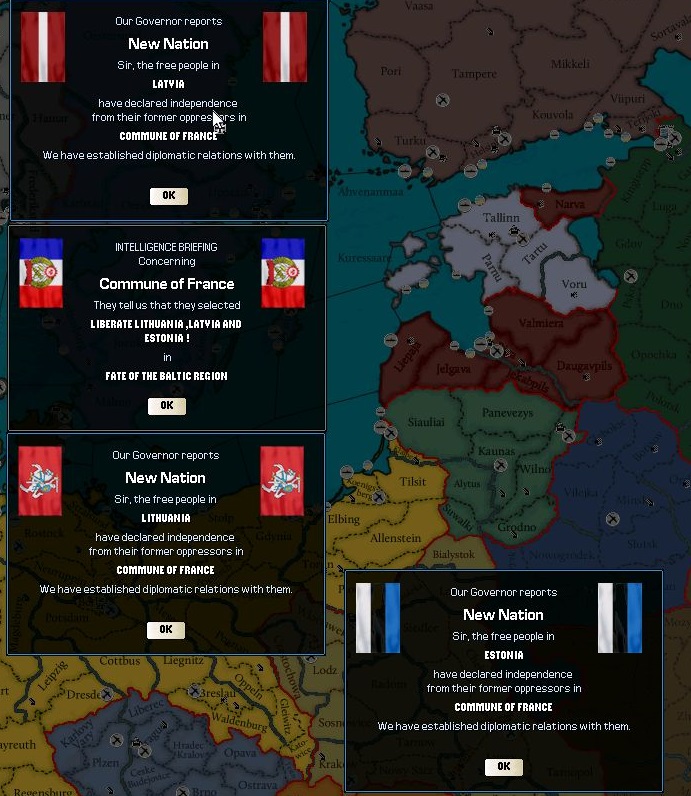 This need became more and more glaring as France completed its conquest of Mitteleuropa. 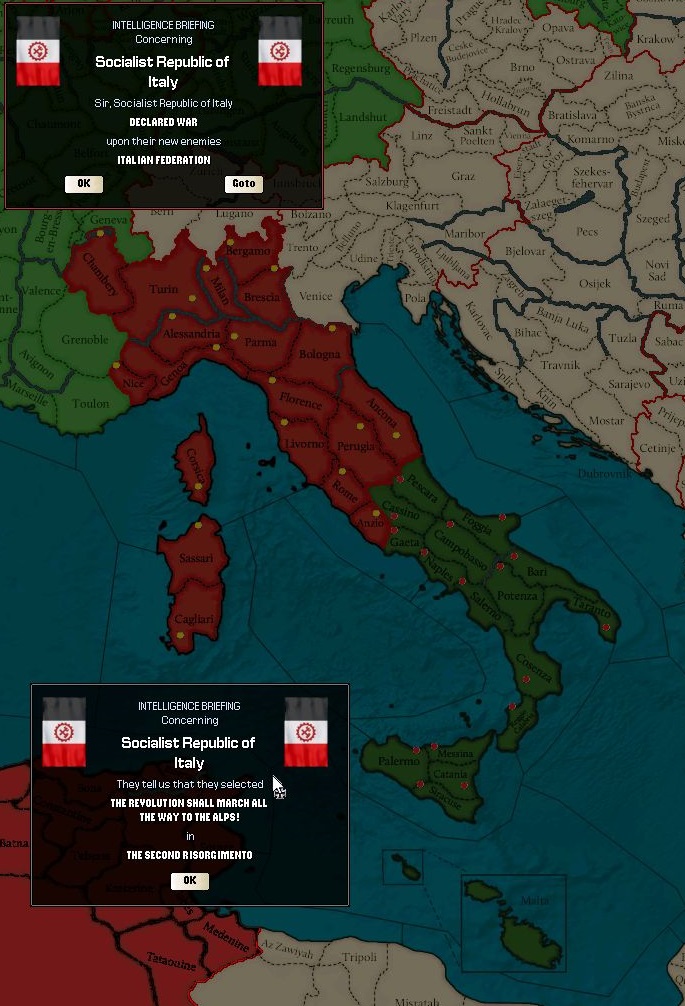 Indeed, the declaration of war against the Italian Federation meant that, in addition to France and the newly syndicalist Germany, Italy would likely become a major power in its own right.  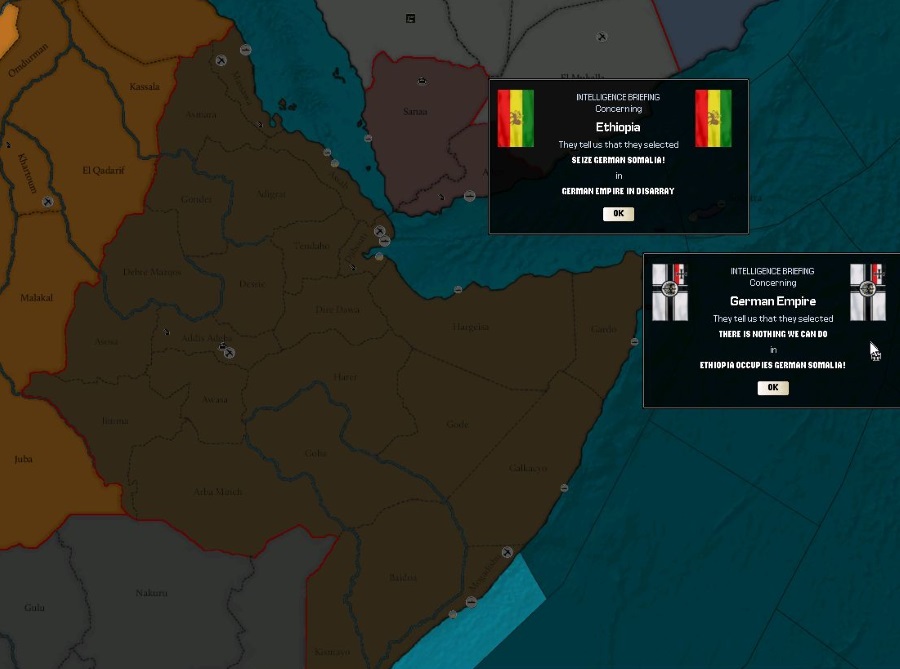 The logistics of a war in Europe while not having any allies in Europe were daunting, but the collapse of the German Empire did provide some good news. The German colonies in Aden and Somaliland were taken by Yemen and Ethiopia, making the Horn of Africa neutral territory for the first time. 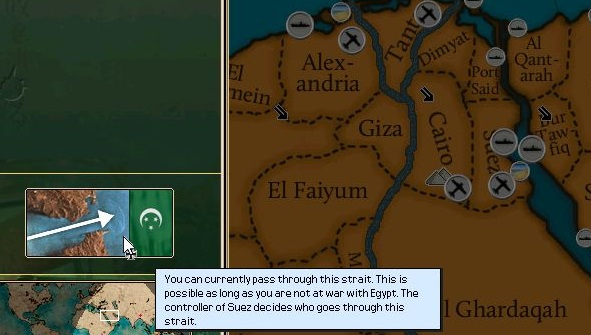 More importantly, the Egyptian bloc completed its territorial ambitions by seizing the Suez Canal. As the Entente was on relatively good terms with the Arab bloc, it was now able to use the canal for the first since the war began.   Despite the focus of Entente policy pivoting to Europe, Japan was still minding its own interests as the leader of the Sphere, inking a deal with the Philippines to build a Japanese naval base in that archipelago. The Japanese did not necessarily need the base, but there was widespread political support for the idea of drawing the Philippines into the Sphere through diplomatic and economic maneuvers.  Six new aircraft carriers were commissioned in May of 1940, giving the Imperial Japanese Navy almost the same number of carriers as the Republican Navy.  The Imperial Japanese Navy began to deploy squadrons to the Gulf of Mexico, keeping them somewhat sheltered from the Republican Navy. The first group to go was a squadron of cruisers. The carrier and battleship fleets would follow in time. There were still operations ongoing on the Indian and Pacific Oceans, but once those were completed, then the majority of the IJN was likely to end up in the Atlantic.  One arm of the Navy that could begin its Atlantic operations as soon as possible was the submarine arm, which was allowed to base in Dakar, giving it an excellent base from which to operate against Internationale trade with its partners in Latin America.   Never wanting to be totally edged out by the IJN, the Imperial Japanese Army secured funding for a major building program. Specifically, they sought to build powerful divisions of medium tanks and motorized infantry that would be even more rapid than the cavalry that had been used to great effect thus far. ~*~*~ STRATEGY VOTE: Africa Mittelafrika had declared itself neutral in the war in between the Entente and Mitteleuropa, an arrangement that was clearly farcical, but one that the South African Federation and National France both respected for convenience. 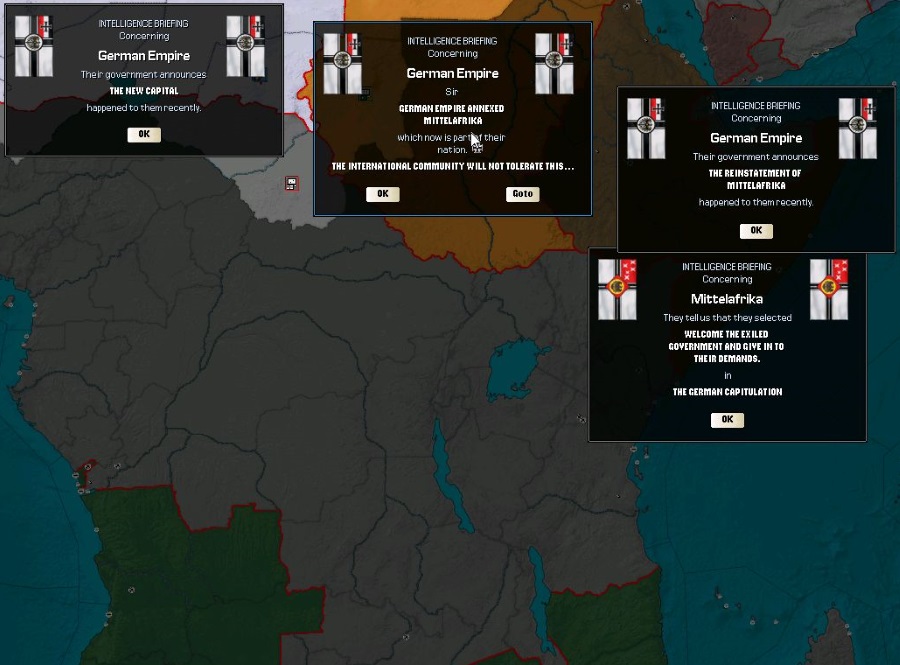 This situation changed when the German Empire sought a place from which to operate their government in exile. They chose their largest colony by a wide margin, Mittelafrika. 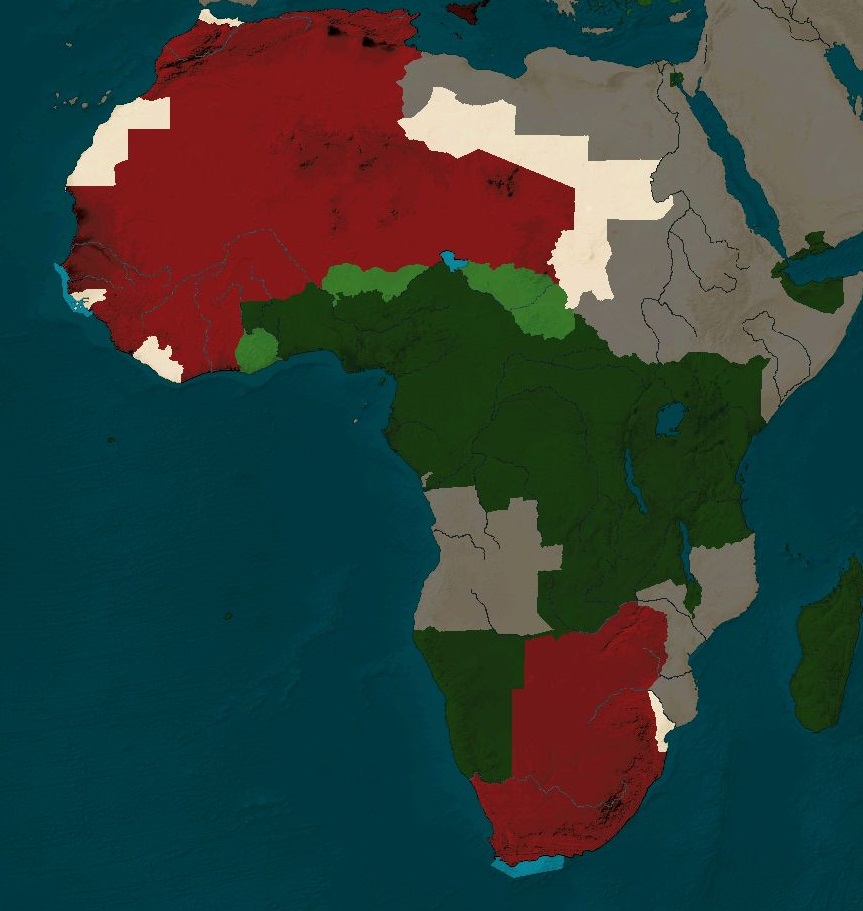 Our two allies in Africa have no choice now but to recognize a state of war with the German colonies in Africa.  In addition, the Internationale, eager for a new front in the global revolution, has chosen Africa as their target.  The Internationale has decided to fund socialist revolutionary groups all over Africa, including in our two allies. 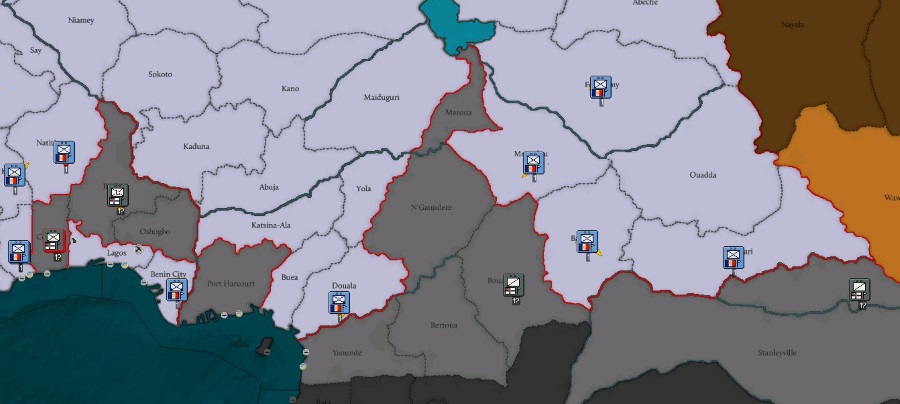 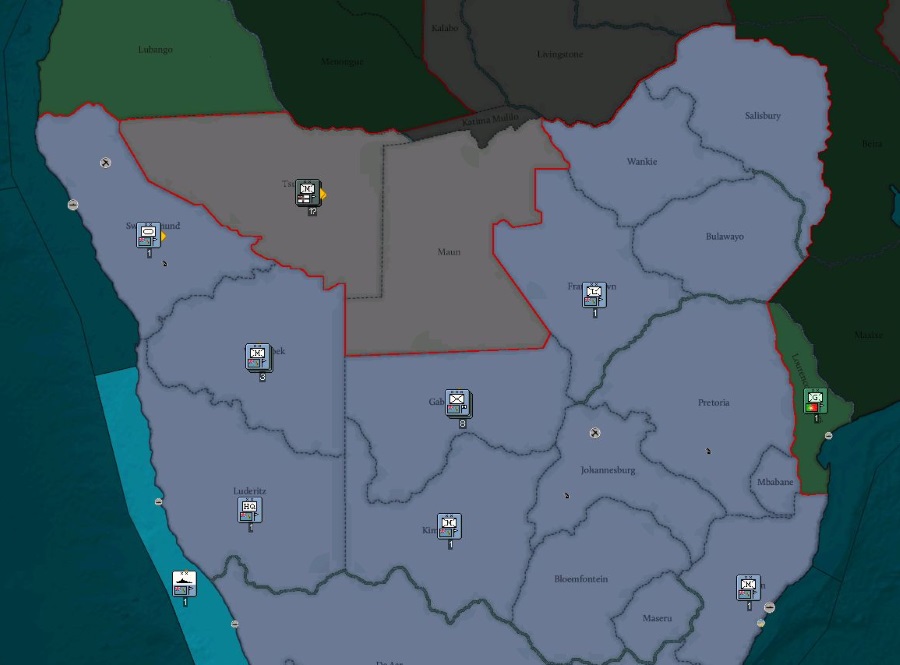 Our allies in Africa have conducted themselves well so far in their conflict against the Germans, but it is unknown if they will be able to handle the dual strains of war in Central Africa and the Internationale plan to engineer a wave of socialist revolution across the continent. 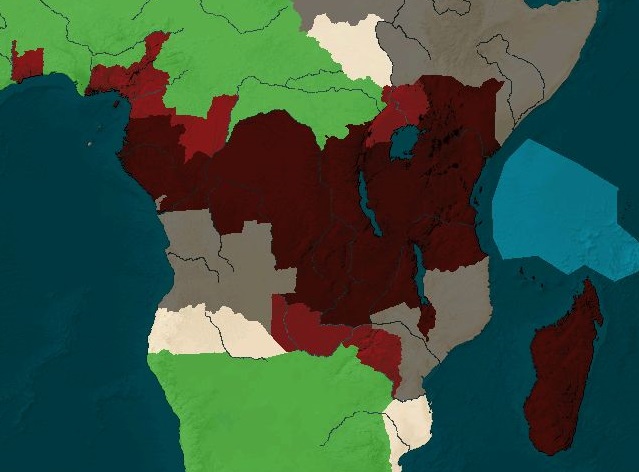 Hopefully, the Germans will fall before there is too much trouble from the syndicalist efforts, and both of our allies have made great progress so far.  Nevertheless, the option always remains for troops newly freed up from the victory in India to be sent to Africa.  We could send an expeditionary force to South Africa or National France or both in order to bolster their defenses against potential socialist troubles, or we could use these forces to invade East Africa ourselves, carving out our own sphere of influence on the continent. Or we could listen to the vocal minority which decries any Japanese involvement in Africa as a betrayal of the Sphere’s professed anti-colonial principles. Option A: Assist the National French All twelve divisions will be sent to French West Africa, where they will be used to guard against potential socialist revolutions in Guinea. quote:”Algeria is the best base we have for an invasion of Europe, and so we would do our best to defend it from the scheming of the socialists.” - Hidesuke Kamimura, IJA Officer Option B: Assist the South Africans All twelve divisions will be sent to South Africa, where they will guard against potential socialist revolution by the France-supported ANC and to fight Mittelafrika. quote:”The French nationalists are, unfortunately, an unsavory and authoritarian lot. We ought to be helping the South Africans gain more territory before we help the French.” - Kaishou Yokoyama, Minseito member of the Diet Option C: Assist Both Six divisions will be sent to each area for the same purposes. quote:”There is enough to go around, I think. Both of our allies have fairly large well-equipped militaries and should not require too much help from us to be able to hold the continent.” - Takushi Sakuma, IJA Officer Option D: Invade East Africa The twelve divisions will be used to land in Kenya. quote:”So many Japanese have this idea that Africa is inherently a European sphere. Europe is in shambles, Europe is a wreck! The Sphere has just as much a right to influence in Africa as Europeans, whether they be exiles or settlers.” - Dai Tanikawa, Seiyukai member of the Diet quote:”The Taishuto are not wrong when they complain about the discrimination present in both National France and South Africa. Why not establish a model African republic in the east and see what happens when we let the Africans rule themselves for once? We have good relations with Ethiopia, and I do not see any reason why we wouldn’t be able to establish good trade with an East African state. Of course, we would need to liberate the territory first.” - Kouichi Miyanohara, Minseito member of the Diet Option E: Stay Out of Africa The twelve divisions will be staged in North America for the planned invasion of Britain. This option does not mean that Africa won’t be used as a staging ground for future operations, but that Japan will not participate in the invasion of German Africa. quote:”You call yourselves liberals and democrats?! You got the entire Sphere riled up to throw out the German colonizer and now you want them to go die to exploit Africa?! Hypocrisy! Stay out of Africa, let the Europeans die for their own plunder!” - Yukana Furutani, Taishuto member of the Diet
|
|
|
|
E and nothing less! We should be building up for the war in Europe, not engaging in hypocritical African adventures!
|
|
|
|
D
|
|
|
|
D
|
|
|
|
A. We can pass through the Suez canal as long as we keep up our good relations with the Egyptians, but we will need to secure a base in the Mediterranean to strike at the soft underbelly of Europe.
|
|
|
|
D Don't want to lose Africa but gently caress the infra bottleneck of the Sahara.
|
|
|
|
E, C, A, B, D
|
|
|
|
E, failing that, D
|
|
|
|
D
|
|
|
|

|
| # ? Apr 23, 2024 12:37 |
|
E, C, A, B, D
|
|
|


































